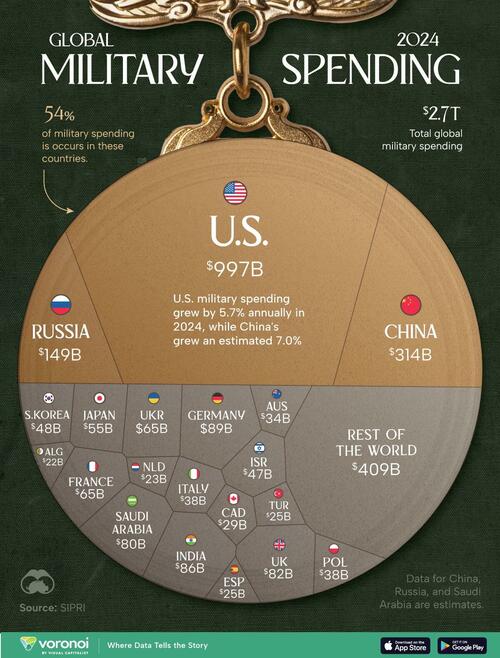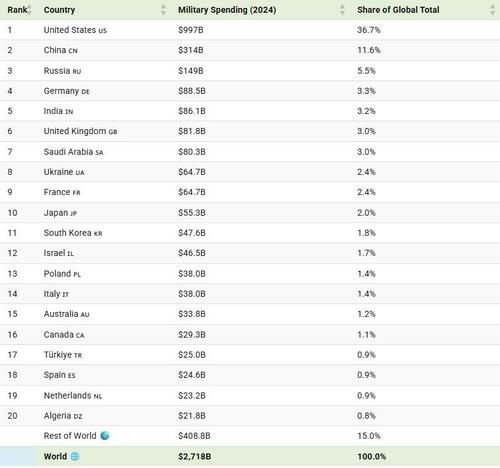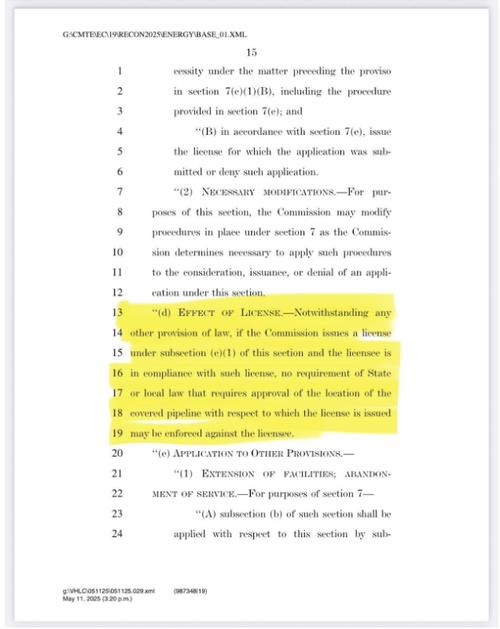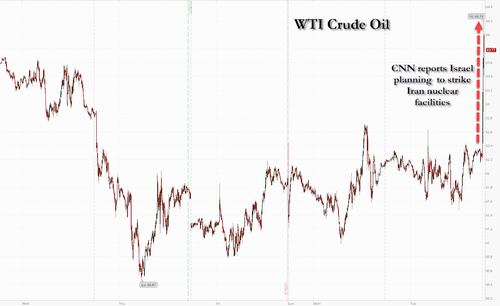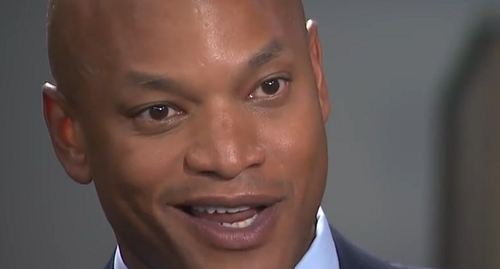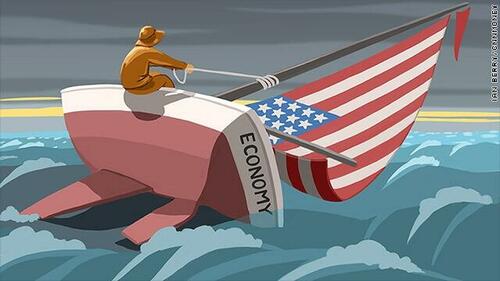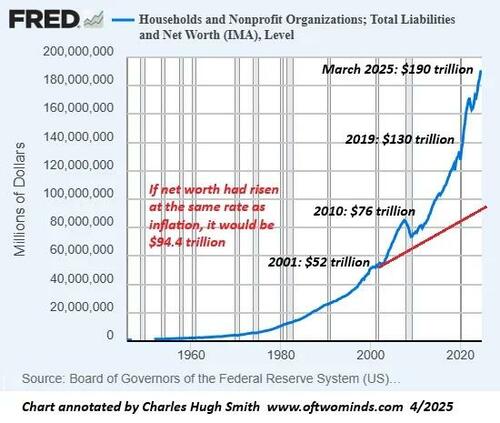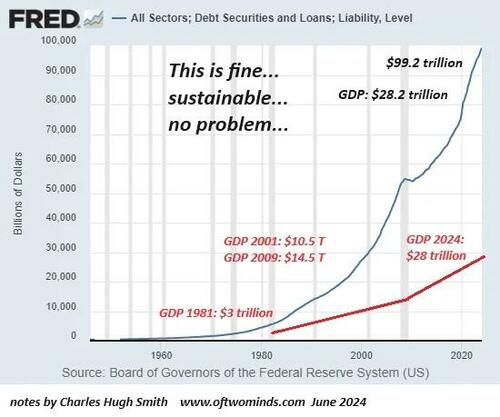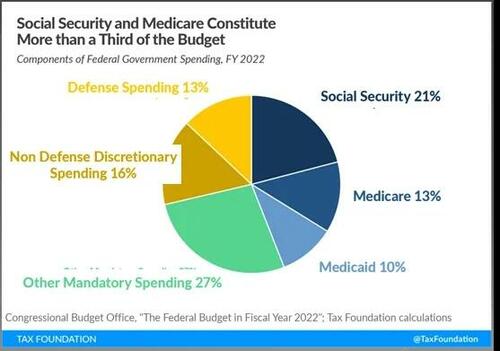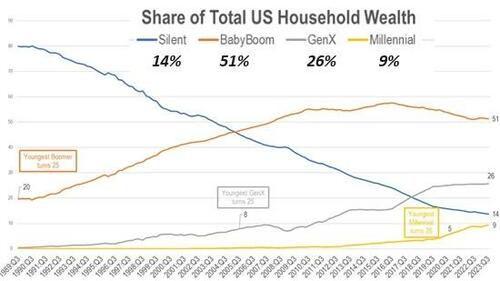“What is perfection in love? Love your enemies in such a way that you would desire to make them your brothers … For so did He love, Who hanging on the Cross, said ‘Father, forgive them, for they know not what they do.’” (Luke 23:34)
Distinction Matter - Subscribed Feeds
-
Site: Real Investment Advice
Monday was a record-setting day. Stocks opened down 1% on news that Moody's downgraded the US credit rating to AA. While some perceived the downgrade as problematic, retail investors, aka individuals, bought stocks at the highest rate ever. Per JP Morgan, retail investors purchased a net of $4.1 billion of US stocks in the first three hours of trading. As their graph below shows, Monday's retail buying stampede dwarfs prior instances.
While the retail net inflow was quite impressive, it does leave the bulls and bears with a consideration. We should ask ourselves who the retail investors bought the stock from. The answer, by default, is institutional investors. This trend of retail buying from institutional investors has been ongoing. As we wrote in Smart Money or Dumb Money: Who Will be Right:
Smart money (institutions and hedge funds) is aggressively selling this market while individual investors, aka dumb money, are aggressively buying. The difference in opinions is stunning.
Typically, institutional investors are right; however, over the last few years, retail has proven to be the smarter money. Is retail out of money? Or will institutions cover?

What To Watch Today
Earnings

Economy
- No notable economic releases today
Market Trading Update
Yesterday's commentary noted the numerous momentum indicators suggesting higher asset prices ahead. While the markets are indeed short-term overbought and due for a pullback, the bull market remains intact and will likely end the year with higher, rather than lower, prices. However, when markets rally as hard as they have lately, adding exposure to the market as needed becomes difficult.
The subject of this weekend's newsletter will be "Trading An Unstoppable Bull Market." This will not be the first time we have written this article, but every time we get into similar market environments, the challenges remain the same for investors.
There are millions of different ways to approach technical analysis, and investors use millions of combinations of technical indicators to try to decipher market movements. I am only going to discuss how we do it with you.
Notably, technical analysis does NOT predict the future. It is the study of historical price action, which is the purest representation of the psychology of market participants. From that study, we can make statistical observations about the behavior of market participants in the past. Those assumptions can help form a “guess,” assuming similar variables, about how they may act in the near term.
For our portfolio management needs, we keep our analysis very simple. We use one indicator to indicate if prices are overbought or oversold, two moving averages to determine the trend of prices, and Bollinger bands to warn of significant deviations from those moving averages. I show the technical setup in the sample chart below from SimpleVisor.com.

We are looking for either “warning signs” that stocks could be due for a short to intermediate-term, corrective period, or indications that they are oversold and ready to advance. Currently, we are dealing with the former.
Historically, when prices move toward the upper bands of 2- or 3-standard deviations above the 50-day moving average (dma), the Relative Strength Index (RSI) is overbought, and the MACD is crossing lower from a high level, stock prices generally correct to some degree. Such is the potential environment we will likely deal with in the next few weeks as we move into June and stock buybacks begin to fade. This is also why we have suggested taking profits, rebalancing risk, and holding cash for a better entry point.
However, while we are waiting for an entry point to increase exposure, it is essential to remember the most important commandment:
Commandment #1: “Thou Shall Not Trade Against the Trend.” – James P. Arthur Huprich
Let me be very clear. We are discussing risk management. You must understand the market’s overall trend and when it is changing. The negative price trend from April is over, and the market continues to trend positively. That is just what it is.
Currently, we are in a “bull market” advance. As such, we want to maintain our exposure to equity risk. However, this does not mean we should ignore what the market tells us and let the ebbs and flows wash over us. Eventually, another “ebb” will come, and we will want to increase risk accordingly. However, that is not today.
“In a bull market, you can be either long or neutral. In a bear market, you can only be neutral or short.” – Dennis Gartman
While the market could certainly pull back to the lower of those “bands,” corrections will likely remain confined to the 50-dma. As such, we will want to use those opportunities to trade portfolios into higher levels of equity exposure. With the market currently more overbought and extended, we want to remain cautious about committing our cash reserves to the broad market more aggressively.
“Willingness and ability to hold funds uninvested while awaiting real opportunities is a key to success in the battle for investment survival.” – Gerald Loeb
I hope this helps.

World Government Bond Yield Curves
The graph below from Trading View provides some context for the level of US Treasury yields. As shown, other than the UK, the US has the highest yields across the maturity spectrum. Other than China, all of the curves slope upward. Thus, short-term yields are lower than longer-term yields. Such a slope is normal. Moreover, it occurs after most of the slopes were inverted.
The notable difference between the curves is the lower short-term rates for all countries but the US and UK. Excluding Japan, their central banks have been more aggressive in cutting rates. While deficit- and tariff-related inflation narratives keep US yields higher than other countries, investors focused on the historical drivers of yields (inflation and economic activity) should find value in the higher yields. However, the battle between narratives and fundamentals favors the narratives for now.

How To Achieve Financial Independence And Retire Early (FIRE)
The FIRE movement—short for Financial Independence, Retire Early—has gained popularity among those who want more control over their time and financial future. Unlike traditional retirement models, FIRE encourages aggressive saving and disciplined financial planning to reach financial independence far earlier than the typical retirement age.
Whether you dream of leaving the 9-to-5 grind in your 40s or simply want to build more freedom into your life, understanding the FIRE retirement strategy and how to build a financial independence plan is essential.
Tweet of the Day

“Want to achieve better long-term success in managing your portfolio? Here are our 15-trading rules for managing market risks.”
Please subscribe to the daily commentary to receive these updates every morning before the opening bell.
If you found this blog useful, please send it to someone else, share it on social media, or contact us to set up a meeting.
The post Retail Is Fearless: Buy The Dip Is On Steroids appeared first on RIA.
-
Site: PeakProsperityEpstein's death inconsistencies suggest homicide, not suicide; official narratives questioned.
-
Site: Crisis Magazine

Traditional, orthodox Roman Catholic believers ought to be extremely grateful that American Catholics do not vote on Catholic doctrine, moral teaching, and ecclesiology. Because if they did, and if they got their way, much of the historic Roman Catholic Church would be swept away into the dustbin of history. This conclusion screams from the pages of a recent Pew Research Center survey report…
-
Site: Real Investment Advice
The following paragraph, courtesy of Amazon, reviews the book Death of the Dollar by William Rickenbacker.
Death of the Dollar by William F. Rickenbacker is a critical examination of the economic policies and monetary mismanagement that the author argues are eroding the value of the U.S. dollar and threatening financial stability. Rickenbacker contends that the actions of money managers, including excessive government spending, inflationary policies, and the detachment of the dollar from the gold standard, are systematically devaluing the currency. The book warns of an impending monetary disaster, highlighting how these policies disproportionately harm everyday citizens who rely on the dollar’s stability for savings and investments. Through a blend of economic analysis and historical context, Rickenbacker underscores the dangers of unchecked financial intervention and the potential for a collapse of the dollar’s purchasing power.
Plenty of books, articles, and social media posts herald the same grim forecast as Rickenbacker. For the most part, they rely on similar reasoning. Essentially, lax monetary policy and gross fiscal spending, both deemed to be inflationary, will result in dollar devaluation and ultimately the death of the dollar.
The difference between Rickenbacker’s book and other dollar demise forecasts is that Death of the Dollar was written in 1968! Fifty-seven years later, despite, or possibly because of Rickenbacker’s justifications, the dollar is still the world's reserve currency, and no other sovereign currency, cryptocurrency, or precious metal will replace it anytime soon.
Given the topic's importance and the gross misinformation spread about the dollar’s imminent demise, we review Rickenbacker’s thesis to highlight that today’s warnings have been around for decades and why the odds of them coming to fruition this time are very low, as they were decades ago.

Removal Of The Gold Standard
Rickenbacker’s book was published in 1968, three years before President Nixon closed the gold window, essentially making the dollar a fiat currency. While his book accurately predicted that ground-shaking event, it did not correctly anticipate its impact.
He reasoned that without gold regulating the supply of dollars, unchecked monetary policy would result in reckless “money printing.”
He was correct that the Fed would have more flexibility in managing the money supply. Furthermore, with this added power, we have seen reckless behavior, as he theorized. However, Rickenbacker erred on the money printing allegation.
The Fed doesn’t print money. All money is lent into creation by banks. The Fed prints bank reserves, which allow banks to make loans, i.e., print money, if they choose. More importantly, even if the money supply increases due to Fed incentives to lend, it's unclear whether such activity is good or bad for the economy and how it impacts inflation and ultimately the dollar’s value. That is a function of the productivity of debt.
Simply, productive debt drives economic growth, increases the nation's prosperity, and reduces deficits as a percentage of economic activity. Unproductive debt detracts from economic growth and prosperity and worsens deficits. Weaker growth from unproductive debt tends to be disinflationary.
As judged by an increasing debt-to-GDP ratio, aggregate debt has been unproductive, leading to lower inflation growth rates. Thus, if the concern is that “money printing” would lead to inflation, it may lead to disinflation.
Fed Flexibility
In one respect, Rickenbacker correctly said that giving the Fed more flexibility was a curse. Easy money policy has led to periods of gross speculation and crises, such as in 2008.
However, without the gold shackles, the Fed has incredible power to manage economic crises and avoid a currency collapse. In fact, despite the 2008 crisis having roots in the US mortgage market and the prospect of the collapse of the US banking system, the world flocked to dollars during the crisis, as shown below.

Most crises have been accompanied by a stronger dollar, proving that the dollar is the port in the storm foreign investors seek when economic confidence is lacking, and liquidity is paramount.

Excessive Government Spending
The book criticizes massive federal expenditures, particularly on social programs and military efforts, which create budget deficits, drive up inflation, and ultimately devalue the dollar. The book was written while Lyndon Johnson spent heavily on the Vietnam War and domestic programs. Again, Rickenbacker was correct in worrying about inflation, a big problem throughout the 1970s.
Despite ever-increasing government spending and an increasing debt-to-GDP ratio, the globalization of trade has expanded rapidly since his book was published. With it, foreigners' demand for dollars has been growing, and in mirror fashion, so is their need to invest the dollars, which helps us fund our deficits.
Even today, with “runaway” deficits making headlines daily, the dollar remains in the upper range of the last 35 years.

Dollar Devaluation In Context
Rickenbacker believed that easy money Federal Reserve policies, such as low interest rates and expanding the money supply, would fuel inflation that would erode the dollar’s purchasing power. He was right, as evidenced by comparing what a dollar buys today versus yesteryear. However, the argument provides little context.
For instance, in the 1950s, a hamburger (15 cents), fries (10 cents), and a Coke (10 cents) at McDonald's cost less than 50 cents. Today, the same meal could run nearly $10.
Although decades of inflation have drastically eroded the dollar's value, our standard of living has risen appreciably. To wit, the purchasing power of one dollar in 1947 has eroded to 7 cents. However, as shown below, inflation-adjusted incomes have risen fivefold since 1947. The dollar buys less, but our incomes buy more!

Trade and Balance of Payments Deficits
Rickenbacker points to persistent U.S. trade deficits and dollar outflows abroad, which weaken the currency’s global standing. He is correct that trade deficits have steadily increased, resulting in more dollars flowing abroad. However, more dollar outflows are a result of more demand for dollars. Furthermore, those dollars ultimately return to the US through investments and loans to the government and corporations. The larger the global economy, the greater the need for dollars, and the more dollars that need to be invested in the US economy.

Rickenbacker Was Right
The author’s concerns are valid and, in many cases, have proven true. However, the victim has not been the dollar. The victims are larger deficits, lower productivity growth, hollowing out of manufacturing, and a growing wealth divide, to name a few.
While these are big problems, they do not necessarily threaten the dollar's status. As we wrote in Four Reasons The Dollar Is Here To Stay:
The pundits will be right someday. The dollar’s death as the reserve currency will come, and some other nation’s currency, cryptocurrency, gold, shells, or something else will take its place. However, that day is not coming anytime soon. The four reasons we describe in the article leave the world with no alternative.
While China is rapidly growing its economy and global trade footprint, it lacks the rule of law and liquid capital markets to sustain a global currency. It’s difficult to see how a communist country can overcome those challenges.
The Euro is the most viable competitor. They have the rule of law, but their capital markets are not nearly liquid enough to facilitate global trade. They also lack the military might to force the usage of the Euro. Let us also remember its finances are in equally bad or even worse shape than the U.S. There is no reason to suspect the euro could overtake the dollar.
Bitcoin? Forget about it! The government will never relinquish its control over the currency because, with that, they lose control of the nation.
Summary
Had Rickenbacker’s Death of the Dollar book solely focused on monetary and fiscal imprudence and its negative implications for the country, he would have been proven a seer. Unfortunately, he was wrong to insist that the dollar would lose its status as the world’s reserve currency.
The graph below, courtesy of the Federal Reserve, shows how the dollar's usage in global transactions has been stable for the last two decades. The index calculation, as detailed at the bottom of the graphic, is based on the primary uses of currencies.
The post Death Of The Dollar: An Eternal Tale appeared first on RIA.
-
Site: Crisis Magazine

On a recent Tuesday, beneath a wide, blue sky stretched over the French countryside, two Benedictine Sisters of Montmartre led me into a small room to speak with the bishop who had offered the Holy Sacrifice of the Mass. They spoke softly in French to Bishop Pascal Marie Roland, the shepherd of Belley-Ars, who listened in silence, nodding, his gaze fixed on the floor. When he finally looked up…
-
Site: Mundabor's blogA video has surfaced of the now Pope Leo XIV, wearing an absolutely stupid-looking university hat, criticising those who criticised the Evil Clown. Because I feel directly – even in my insignificance – called into the question by a prelate who is now Pope, I will allow myself to *not* let bygones be bygones and […]
-
Site: AsiaNews.itThe government in Tbilisi is proudly touting Georgia's buoyant GDP figures, claiming that the economy has tripled in recent years thanks to its own policies. However, the real driving force behind this surge has been the indirect effects of the war in Ukraine. ...
-
Site: southern orders
-
Site: Zero HedgeBreaking Down Global Military Spending By Country In 2024Tyler Durden Wed, 05/21/2025 - 04:15
In a world where superpowers are defined by economic and military stature, countries continue to invest hundreds of billions in military and defense every year.
In 2024, global military expenditure reached $2.7 trillion, hitting a record high - and just three countries made up more than half of the total.
This infographic, via Visual Capitalist's Niccolo Conte, breaks down global military spending by country in 2024, highlighting the top military spenders using data from the Stockholm International Peace Research Institute (SIPRI).
The World’s Biggest Military Spenders in 2024
America continues to dominate global military expenditure, spending nearly $1 trillion or 3.4% of its GDP on defense in 2024. U.S. military expenditure makes up over one-third of the global total, and it also has the world’s biggest defense budget.
Here’s a look at the top 20 countries by military spending in 2024:
China follows the U.S. with an estimated $314 billion in military expenditure, up 7% from 2023. Over the last decade (2015–2024), China’s military spending increased by 59%.
Meanwhile, Russia’s spending was up by 38% year over year at nearly $150 billion. Together, the United States, China, and Russia—often considered strategic competitors—made up 54% of global military expenditure in 2024.
Germany and India round out the top five, with both countries ramping up military spending in light of rising geopolitical tensions in recent years. India’s simmering tensions with Pakistan and China contribute to its defense budget.
Meanwhile, as a major NATO member, Germany’s spending is partly down to the conflict between Russia and Ukraine. Together, NATO countries made up 55% of global military expenditure in 2024.
In the eighth spot, Ukraine has seen the biggest jump in military spending in recent years—with its 2024 spending at nearly 10 times 2021 levels. It also has the highest military burden globally at 34.5% of its GDP in 2024. Although peace talks between Russia and Ukraine are ongoing, a complete ceasefire is yet to be achieved.
To see how global military expenditure has evolved in the 21st century, check out 20 Years of Global Military Spending on the Voronoi app.
-
Site: Mises Institute
-
Site: Rorate CaeliCorrispondenza RomanaMay 21, 2025Two words recur frequently in Pope Leo XIV's speeches from the very beginning of his pontificate: “peace” and “unity.” Peace is what the Pontiff invokes in the face of an international scenario that in the Regina Caeli of May 12 he described as "dramatic." Unity is what the Church needs in order to face a fragmented world, as he explained in his May 18 New Catholichttp://www.blogger.com/profile/04118576661605931910noreply@blogger.com
-
Site: Zero HedgeUK Space Ambitions Clash With NATO Airspace ConcernsTyler Durden Wed, 05/21/2025 - 03:30
-
The UK’s new vertical launch spaceport at Saxa Vord poses risks to Icelandic airspace and territorial waters, potentially disrupting transatlantic flights and marine ecosystems.
-
Exclusion zones for rocket launches could interfere with NATO's ability to effectively patrol the Greenland-Iceland-United Kingdom gap, an area of strategic importance for defense.
-
While a memorandum of understanding exists between the UK and Iceland, it may not adequately address the full defense and military ramifications of frequent space launches in this critical region.
When I relocated to the UK from New York in 1984, the Cold War was at its peak. US nuclear and conventional forces were spread across Europe and fears of a Soviet invasion or nuclear exchange were ever-present. In the UK, another critical strategic concern was the Greenland-Iceland-United Kingdom (GIUK) gap, which are two stretches of the North Atlantic separating these three countries. During the Cold War, Soviet naval forces aimed to control this gap to access the broader North Atlantic and block NATO reinforcements to Europe, a scenario famously depicted in Tom Clancy’s Red Storm Rising.
After the Cold War ended and the so-called Peace Dividend reduced the gap’s significance, its strategic importance faded. However, since 2014, with Russia’s renewed assertiveness, the GIUK gap has regained prominence in NATO planning. The US reopened Keflavik Naval Air Station in Iceland in 2016, re-established its 2nd Fleet in 2018 to protect the gap and, as recently as March 2025, Standing NATO Maritime Group 1 increased its patrols in the region.
I warn of danger
While NATO has prepared for Russian threats, a new risk closer to home is now emerging: the UK’s and Europe’s first vertical launch spaceport at Saxa Vord, Shetland. Ironically, this site was once an RAF early warning and air defence base during the Cold War, bearing the motto Praemoneo de Periculis, or “I warn of danger”.
Commercial space launches are still in their infancy, but recent incidents such as SpaceX’s launch failures – spreading debris across Florida and the Caribbean and grounding flights – and a Norwegian test rocket explosion highlight the risks. Saxa Vord itself attempted a rocket launch last August, resulting in an engine explosion. The international nature of space launches means that countries near Saxa Vord, especially Iceland, are directly in the path of up to 30 planned launches per year, four a month at peak, with ambitions to increase to 40 or 50 annually.
These launches pose multiple risks to Iceland and the GIUK gap:
-
Rockets may enter Icelandic airspace, with first-stage returns falling through Icelandic airspace and into territorial waters.
-
Catastrophic failures could scatter debris, whilst hazardous chemicals from rocket propellants threaten marine ecosystems.
-
Rerouted transatlantic flights of up to 76 a day, according to Icelandic air traffic control’s ‘anonymous’ response to the CAA’s Saxa Vord licence consultation.
-
Even more importantly and less scrutinised – the presence of exclusion zones for launches could undermine NATO’s ability to patrol the gap effectively.
Memorandum of Misunderstanding
These risks are partly managed by a memorandum of understanding (MoU) signed between the UK and Iceland in July 2021. The MoU mandates the closure of designated Icelandic sea and airspace areas before launches and outlines some procedures for debris recovery. However, while a handful of Icelandic officials are aware of the implications, the broader political and media discourse in both countries has yet to grapple with the full defence and military ramifications of the impact of such numbers of launches into NATO’s strategic sea and airspace.
The current trajectory of UK space ambitions – and planned rocket launch from the UK – means the UK’s space ambitions could inadvertently undermine the very security framework that underpins Western interests in the North Atlantic and the Arctic.
There is an urgent need for both the UK and Icelandic governments to reassess the risks from Saxa Vord, ensuring that existing bilateral agreements align the UK’s space programme with enduring geopolitical realities and the security needs of NATO and its allies. Saxa Vord has to be a success – but upon the present strategy security triumphs space whilst Iceland is developing its own space strategy – which might well consider how launch capability could be nationalised to give greater control over risk.
-
-
Site: Mises InstituteBankruptcy in the short term is painful. In the long term, it is cleansing decades of poor federal government choices.
-
Site: Zero HedgeTea Or Coffee?Tyler Durden Wed, 05/21/2025 - 02:45
Today, May 21 marks International Tea Day.
With a global market valued at nearly $50 billion in 2023, tea is said to be the second most consumed beverage in the world.
As the United Nations notes, the tea industry provides "a major source of income and export earnings for some of the poorest countries and, thanks to its high labor requirements, generates numerous jobs, particularly in remote and economically disadvantaged areas."
As Statista's Anna Fleck reports, Statista Consumer Insights surveyed 23 countries around the world to find out more about global tea drinking habits.
It found that while tea was a popular choice for many respondents, coffee proved to be consumed by a higher share of adults in almost every country surveyed, save for Turkey, Morocco and India.
You will find more infographics at Statista
In the United States a comparatively lower share of people said they drank tea (46 percent) or coffee (53 percent) regularly, while soft drinks were more popular (56 percent).
-
Site: The Unz ReviewIt’s an oft-heard complaint, even a canard, about white people in general and white conservatives in particular. The immigration issue is framed in terms of white dislike for other races. It's misleading, even among most white right-wing types. While it’s true that some whites do harbor disdainful, contemptuous, hostile, and even hateful views in regards...
-
Site: The Unz ReviewOn the road in Iran - The International North South Transportation Corridor (INSTC) is one of the most crucial geoeconomic/infrastructure projects of the 21st century. It unites at its core three key BRICS nations – Russia, Iran and India – branching out to the Caucasus and Central Asia. When fully operational, the INSTC will offer...
-
Site: The Unz ReviewSometimes I have to pinch myself to accept that what happened in the United States — in the nation that leads the free world — between 2020 and today actually occurred. It is clear from the new book — Original Sin: President Biden’s Decline, Its Cover Up and His Disastrous Choice to Run Again —...
-
Site: The Unz ReviewThis interview is also available on podcast platforms and Rumble. In a world gripped by daily catastrophes, there is one that affects all but lacks the attention it deserves. The climate crisis — pervaded by ecological collapse, war, endless resource accumulation fueled by capitalism — is the issue of our time. The warning signs are...
-
Site: The Unz ReviewRumble link Bitchute link Paul Craig Roberts, the illustrious economist and architect of Reaganomics, became a notable voice of 9/11 truth two decades ago—a courageous move, given that he’s important enough to raise the ire of the perps and coverup team. Since then he has been calling it like he sees it and hasn’t backed...
-
Site: The Unz ReviewFrance has seen an incredible 86 percent increase in sexual violence in the last 10 years, with mass immigration fueling this trend. It is the same in Sweden, Norway, Germany, all over Europe. The French women will not receive the French army’s protection. The French government, like the governments in Norway, Sweden, Germany and all...
-
Site: AntiWar.comReprinted with permission from The Realist Review. To hear an American President, the supposed leader of the self-styled free world, no matter how disingenuously, declare that the age of nation building is over, and deliver a thunderous denunciation of the nation building project, its courtier class, and their influence on world affairs in a foreign … Continue reading "Which Way, Liberal Interventionist?"
-
Site: The Unz ReviewPerhaps Putin should tell the Russian people and the Russian Army that his interest in resolving the conflict in Ukraine with peace negotiations lies in the possibility that the negotiations could be used to achieve a Great Power Agreement like what he and Lavrov tried to achieve with the West during the winter of 2021-2022...
-
Site: AntiWar.comThis week the United States House of Representatives passed the ridiculously titled “Mobilizing and Enhancing Georgia’s Options for Building Accountability, Resilience, and Independence Act (MEGOBARI Act) by a vote of 349 to 42. The latter “nay” vote consisted of 34 stalwart America First, non-interventionist Republicans and but 8 Dems from the AOC/Squad wing. The rest … Continue reading "Out of Their Minds on Georgia"
-
Site: The Unz Review– Donald Trump Feb. 26, 2025 Donald Trump appeared on The Apprentice, a reality-competition show, with a prize of a one-year $250,000 contract to promote one of Trump’s properties. Trump was the show’s centerpiece, which bolstered his reputation as a ruthless billionaire. Personally, I find “reality” shows creepy, but even I could not escape Trump’s...
-
Site: Euthanasia Prevention Coalition
Alex Schadenberg
Kelsi Sheren, on Twitter, commented on the lobbying by euthanasia groups to legalize euthanasia for "mature minors" (children) in Canada.
Executive Director, Euthanasia Prevention CoalitionThe response to her social media was phenomenal but it also elicited a response from some euthanasia lobby leaders who accused Sheren of fear mongering and not getting her facts straight.
Sheren responded with a link to a Global news story from February 16, 2023 reporting on the Canadian government Special Joint Committee on Medical Assistance in Dying (AMAD) released a report calling for the expansion of euthanasia (MAiD) to include mature minors.
Euthanasia for "mature minors" (children) is not legal in Canada but the issue of child euthanasia is being promoted by Canada's euthanasia lobby and a federal government committee recommended on February 15, 2023 that euthanasia be extended to "mature minors."I responded to the February 15, 2023 (AMAD) report by stating:
The report by the Special Joint Committee on Medical Assistance in Dying (AMAD) was tabled in the House of Commons on February 15, 2023 calling for a drastic expansion of euthanasia (MAiD) in Canada. Among the recommendations, the report recommended that euthanasia be expanded to include children "mature minors."
That the Government of Canada establish a requirement that, where appropriate, the parents or guardians of a mature minor be consulted in the course of the assessment process for MAID, but that the will of a minor who is found to have the requisite decision-making capacity ultimately take priority.
Recommendation 19 in the report stated:This means that parents or guardians may or may not be consulted, in the euthanasia death of a child that is deemed to have decision-making capacity.
To understand Recommendation 19 better we need to go back to the draft policy developed by the Hospital for Sick Children in Toronto on euthanasia for "mature minors" that was published as a report in the Journal of Medical Ethics in September 2018.
- Article: Sick Kids Hospital Toronto will euthanize children with or without parental consent (Link).
Sick Children's hospital draft policy applied the same "ethics" for mature minors to make medical decisions as for making a decision to be killed.The draft policy by Toronto's Hospital for Sick Children set out what can be expected if Canada permits euthanasia for children (mature minors).
Children who are deemed, by their physician, as competent to make medical decisions would also be deemed competent to decide, with or without the consent of their parents, to be killed by lethal injection.
The Canadian government report suggested that child euthanasia and euthanasia of incompetent people by advance request be permitted. Both of these issues fundamental change the meaning of consent.
Child euthanasia is wrong, based on the meaning of effective consent.
Euthanasia is wrong because it enables doctors and nurse practitioners to literally kill their patients.
-
Site: Real Jew News
White Togetherness
May 20 2025___________________________________
More Vids!
+BN Vids Archive! HERE!
___________________________________
Support The Brother Nathanael Foundation!
Br Nathanael Fnd Is Tax Exempt/EIN 27-2983459

Or Send Your Contribution To:
The Brother Nathanael Foundation, POB 547, Priest River, ID 83856
E-mail: brothernathanaelfoundation([at])yahoo[dot]com
Scroll Down For Comments
-
Site: Zero HedgeHow Hackers Can Control Your Phone With "Zero-Click" AttackTyler Durden Tue, 05/20/2025 - 20:55
Authored by Chris Summers via The Epoch Times (emphasis ours),
In 2025, most people are inseparable from their laptops and smartphones. With that familiarity has come a wariness of the dangers of clicking on unsolicited emails, SMS, or WhatsApp messages.
But there is a growing menace called zero-click attacks, which have previously targeted only VIPs or the very wealthy because of their cost and sophistication.
 Illustration by The Epoch Times, Shutterstock
Illustration by The Epoch Times, Shutterstock
A zero-click attack is a cyberattack that hacks a device without the user clicking anything. It can happen just by receiving a message, call, or file. The attacker uses hidden flaws in apps or systems to take control of the device, with no action needed from the user and the user remains unaware of the attack.
“Although public awareness has increased recently, these attacks have steadily evolved over many years, becoming more frequent as smartphones and connected devices proliferated,” Nathan House, CEO of StationX, a UK-based cybersecurity training platform, told The Epoch Times.
“The key vulnerability is in the software, rather than the type of device, meaning any connected device with exploitable weaknesses could potentially be targeted,” he said.
Aras Nazarovas, an information security researcher at Cybernews, told The Epoch Times why zero-click attacks usually target VIPs, rather than ordinary individuals.
“Since finding such zero-click exploits is difficult and expensive, most of the time such exploits are used to gain access to information from key figures, such as politicians or journalists in authoritarian regimes,” he said.
“They are often used in targeted campaigns. Using such exploits to steal money is rare.”
In June 2024, the BBC reported that social media platform TikTok had admitted that a “very limited” number of accounts, including those of media outlet CNN, had been compromised.
While ByteDance, the owner of TikTok, did not confirm the nature of the hack, cybersecurity companies such as Kaspersky and Assured Intelligence suggested it stemmed from a zero-click exploit.
“The part that requires high levels of sophistication is finding bugs that allow such attacks and writing exploits for these bugs,” Nazarovas said.
“It has been a billion-dollar market for years, selling zero-click exploits and exploit chains. Some gray/dark market exploit brokers often offer $500,000 to $1 million for such exploit chains for popular devices and apps.”
 An attendee inspects the new iPhone 16 Pro Max during event at the Apple headquarters in Cupertino, Calif., on Sept. 9, 2024. Experts warn of a rise in zero-click attacks—cyberattacks that compromise devices without any user interaction. Justin Sullivan/Getty Images
An attendee inspects the new iPhone 16 Pro Max during event at the Apple headquarters in Cupertino, Calif., on Sept. 9, 2024. Experts warn of a rise in zero-click attacks—cyberattacks that compromise devices without any user interaction. Justin Sullivan/Getty Images
Nazarovas added that while ordinary users have been hit in the past by zero-click ‘drive-by’ attacks. These are attacks that emerge after the unintentional installation of malicious software onto a device, often without the user even realizing it. They have become more infrequent with the growing gray market for such exploits.
House said zero-click exploits often seek out vulnerabilities in software and apps that are expensive to discover, which means the perpetrators are usually “nation-state actors or highly-funded groups.”
Expanded Spyware Markets
Although there have been recent innovations in AI that have made certain cyber crimes, such as voice-cloning or vishing, more prevalent, Nazarovas says there is no evidence yet that it has increased the risk from zero-click attacks.
House said people could use AI to “write zero-click exploit chains for people who would have otherwise lacked the time, experience, or knowledge to be able to discover and write such exploits.”
But, he said, the increase in zero-click attacks in recent years, “stems mainly from expanded spyware markets and greater availability of sophisticated exploits, rather than directly from AI-driven techniques.”
He said zero-click attacks have existed for more than a decade, the most infamous of which was the Pegasus spyware affair.
In July 2021, The Guardian and 16 other media outlets published a series of articles, alleging that foreign governments used the Israeli-based NSO Group’s Pegasus software to surveil at least 180 journalists and numerous other targets around the world.
Alleged targets of Pegasus surveillance included French President Emmanuel Macron, Indian opposition leader Rahul Gandhi, and Washington Post writer Jamal Khashoggi, who was slain in Istanbul on Oct. 2, 2018.
 A woman checks the website of Israel-made Pegasus spyware at an office in Nicosia, Cyprus, on July 21, 2021. Pegasus has been tied to several high-profile international zero-click attacks in recent years. Mario Goldman/AFP via Getty Images
A woman checks the website of Israel-made Pegasus spyware at an office in Nicosia, Cyprus, on July 21, 2021. Pegasus has been tied to several high-profile international zero-click attacks in recent years. Mario Goldman/AFP via Getty Images
In a statement at the time, NSO Group said, “As NSO has previously stated, our technology was not associated in any way with the heinous murder of Jamal Khashoggi.”
On May 6, a California jury awarded WhatsApp’s parent company, Meta, $444,719 in compensatory damages and $167.3 million in punitive damages, in a privacy case against NSO Group.
The WhatsApp complaint was focused on the Pegasus spyware, which, according to the lawsuit, was developed “to be remotely installed and enable the remote access and control of information—including calls, messages, and location—on mobile devices using the Android, iOS, and BlackBerry operating systems.”
“While ordinary users can occasionally become collateral targets, attackers generally reserve these costly exploits for individuals whose information is especially valuable or sensitive,” Nazarovas said.
According to Nazarovas, corporations offer hackers ‘bug bounties’ to incentivize them to find these exploits and report them to the company, rather than selling them to a broker who then sells them on to parties who use them illegally.
Read the rest here...
-
Site: Zero HedgeDavid Sacks' Lieutenant Explains The Real Reason Why Trump's AI Deal With UAE Is A Yuge Win For AmericaTyler Durden Tue, 05/20/2025 - 20:30
Sriram Krishnan, Senior White House Policy Advisor on Artificial Intelligence, joined the Monday edition of TBPN to explain why the U.S.-UAE AI Partnership is a strategic victory for the United States in its race to lead AI development against China, a perspective largely (and unsurprisingly) overlooked by mainstream media.
EXCLUSIVE: we asked @sriramk to break down the $600B deal announced last week by @WhiteHouse.
— TBPN (@tbpn) May 19, 2025
"We signed the first AI acceleration partnership. There are 3 critical components to this deal."
"First, this represents a large investment in US data centers and US AI infrastructure.… https://t.co/cL4RUfgTRV pic.twitter.com/8MRimP0rMgSRIRAM KRISHAN: We signed the first AI acceleration partnership. You guys probably read about in the press, but there are probably three important components that just, I wanted to have the technology brothers have the alpha and the have the first group on that. The most important part, the first part, is that this represents a large investment in U.S. data centers and U.S. AI infrastructure. So these countries will be investing in U.S. AI infrastructure. To make them as equal, if not larger, than the data centers and infrastructure they're building back home. So this means, obviously a large infusion of capital revenue to data centers here in America.
JORDI HAYS: That story was kind of lost. Right? I feel like a lot of the focus was on localized investment and infrastructure.
JOHN COOGAN: To break it down in language that a venture capitalist could understand. This is something like what we're seeing with Stargate where there's a ton of capital forming and that's coming from SoftBank, but it's also coming from Middle Eastern investment funds and sovereign nations investing in American infrastructure. And then there's a whole host of companies that might come in the stack to actually build a new data center. Is that right?
SRIRAM KRISHAN: Exactly. You should be doing our talking points. I would say, look, these countries have AI ambitions, right? They want to buy American AI. They wanna buy our semiconductors. They want to buy our large language model. They want to use us. And so as a part of this deal, they're agreeing to a few things. The most important thing they're gonna agree to is that capital, like you mentioned, right? Like, and, and this is, by the way, net new. This is not part of any existing project. Sure. These net new deals will mean infrastructure being built out physically in the US.
So for example, if they build out X megawatts of gigawatts of capacity, yep. This will mean the same X megawatts of gigawatts of capacity in the US, and this is an important point. Because some of the chatter has been, Hey, how does America maintain its lead? Well, one of the ways we maintain our lead is everything that is being built up by our allies. We get a matching deal back home. So that's probably the number one headline.
The second headline would be that the vast majority of the GPUs that are as a part of this deal, which is gonna be, say, hosted in the UAE, will be hosted, run, operated by American hyperscaler companies, right? And so, you probably know them all, right? These would be large American companies who. They will be running it, hosting it, maintaining, and this is actually important because this represents an expansion opportunity for all of our companies. This means they would get to win market share away from competition from other countries. And obviously there's a whole huge amount of revenue and ecosystem coming in. And so that's the second key point, the vast majority of the GPUs are going to be run by American companies, often by a lot of our friends in these large, uh, you know, hyperscaler companies.
And the third point, and this is, again, something just lost in the chatter, is I'm sure you've heard questions about, Hey, how do we make sure these GPUs, you know, don't get to somebody they don't need to be. So there are rigorous security protocols in place, so every GPU gets shipped over. We are gonna make sure that, a., they can't be physically diverted. These are really large boxes. You can't hide them under your t-shirt or your tux and kind of stick them out the door. You can't really go George Clooney Oceans 11 on them. So one is there's going to be a large amount of physical verification and physical security protocols.
The second is remote access. We are gonna make sure through these deals, through the framework that nobody who's not supposed to have access, especially from countries of concern, can get access.
And so these three kinds of the core pillars, and here's why this event, right? And I think everybody in your audience who's like a technology person, a technology brother, or in the software world, here's why they'll understand it. What has history taught as a software industry? The company with the biggest network effect, the biggest ecosystem wins, right? We've all grown up with Microsoft. How did Microsoft win with the Windows and Office ecosystem? Think about this as the American AI ecosystem.
We are getting these resource-rich countries who are critical allies in very interesting geopolitical places to basically adopt the American AI stack, right? Up and down. This means they are going to be part of our ecosystem for years and decades to come, and it essentially forms a shield from them ever adopting or using technology or working closely with some people that we don't want them to work with. In a way, I kind of think of this like a software ecosystem play, where we now have them tied to the American AI ecosystem.
-
Site: Zero HedgeTrump Unveils $175 Billion Plan For "Golden Dome" Missile Defense SystemTyler Durden Tue, 05/20/2025 - 20:05
By Ryan Morgan of Epoch Times
The Department of Defense has selected a design for President Donald Trump’s “Golden Dome” missile defense initiative, Trump announced on May 20.
“I’m pleased to announce that we have officially selected an architecture for this state-of-the-art system that will deploy next-generation technologies across the land, sea, and space, including space-based sensors and interceptors,” Trump told reporters at the White House.
In his first week in office, Trump signed an executive order directing the Department of Defense to devise a plan to implement his missile defense proposal.
“It should be fully operational before the end of my term. So we'll have it done in about three years,” the president said.
Trump said the plan the Department of Defense has selected should cost about $175 billion to complete.
The plan will meld new technologies with existing U.S. missile defense systems.
Canada may also partner with the United States to help develop the improved missile defense shield, the president said. “Canada wants to be a part of it, which would be a fairly small expansion, but we'll work with them on pricing.”
In addition to new and improved space-based sensors and interceptors, Trump’s January executive order called for the Department of Defense to consider non-kinetic missile interception technologies such as lasers.
The order also tasked the department with examining methods and technologies for intercepting missile threats before they can launch, or in their initial boost phase.
Standing beside Trump during the Oval Office announcement, Secretary of Defense Pete Hegseth noted the parallels between Trump’s missile defense proposal and the Strategic Defense Initiative put forth by President Ronald Reagan in the 1980s.
Reagan’s Strategic Defense Initiative included a number of aspirational missile defense concepts, and some critics referred to it as Reagan’s “Star Wars” proposal.
“President Reagan, 40 years ago, cast the vision for it. The technology wasn’t there. Now it is, and you’re following through,” Hegseth told the president.
Congressional Republicans have put forth a $150 billion supplemental military spending package, with about $25 billion set aside to kickstart the Golden Dome project. The $150 billion defense spending plan is one piece of a larger bill that Trump and his allies are hoping to pass through the reconciliation process, avoiding a potential Senate filibuster.
Trump expressed confidence that the reconciliation bill will pass.
“We’ve already spoken to everybody that we have to speak to,” he said.
“Everybody’s in line.”
Adding to his Golden Dome announcement on Tuesday, Trump named Gen. Michael Guetlein, vice chief of space operations for the U.S. Space Force, as the program manager for the project.
Trump said Guetlein is “one of the most respected people in the world, having to do with defense.”
-
Site: Public Discourse
If you have not yet read the recent First Things essay by the popular writer Freya India, The Right Has Forgotten Feeling, you should.
Twenty-four-year-old India grew up in the dominant, secular culture of the UK without so much as a nominal religious bulwark against its amoral norms. Her female peers, she maintains, desperately need to know the right-coded truths that she now accepts: casual sex is a bad deal for women; religion organized around the traditional family is a good one.
But according to India, the right’s attempts to persuade young women of these realities by way of intellectual argument are mostly futile and sometimes destructive. She counsels those who want to help girls eschew today’s amoral norms in favor of something better to embrace and fulfill—not ignore or condemn—the emotional and spiritual needs that are leading young women to uncritically embrace the secular left’s now-hegemonic lies in the first place. “The left,” India observes, “hears [young women’s] pain.” It “often has the wrong answers,” but “at least it listens.”
I confess that I was skeptical when first saw India’s piece, with its provocative thesis of a title, pop up in my Substack feed. After all, it is one of my foundational contentions that women should eschew both mainstream feminism and “trad” antifeminism precisely because, far from forgetting feeling, each has essentially infantilized and patronized women by elevating emotion and identity to the vaunted place that we should reserve for truth and virtue.
But India has convinced me that for all my harping on reality principles, I have largely failed to notice the only reality that matters here: the young women who most need to imbibe traditional values are constitutionally unable to do so. They cannot keep emotion in perspective, because they have no perspective. And they are not rejecting truth or virtue. A person cannot reject what she’s never seen, learned, or heard about.
The hollow remains of an already amoral, leftist culture are all that today’s young women know. There is nothing left to push back on in youthful rebellion, and nothing left to embrace on the other side. India writes:
Few try to understand what young women might be searching for in therapy culture, finding in liberal feminism, hearing from the left—what needs are being met that aren’t met elsewhere. Don’t we see that this world offers them no other sanctuary? Don’t we see that many young women haven’t “abandoned” faith, haven’t turned their backs on the sacred, but were born into a world already desecrated? That they haven’t forgotten their worth but were never taught it?
India suggests a remedy: that we talk about and argue from feelings rather than statistics, research, and texts. Talk about, for example, “the wound of growing up between two homes” and “help young women see that there are things in this life that should be held sacred, and that includes young women themselves.” And maybe she’s right about how we should relate to today’s twenty-something women. Maybe we should create the equivalent of a Federalist Society for therapists to attract more people with conservative values to psychological counseling. Maybe we should flood the social media zone with as many charismatic traditionalist influencers as we can and see who catches on. For India’s peers, it might be too late for anything else; and these tactics might do some good, as far as they go.
We have much more opportunity to steep the next generation of girls, the ones in preschool and grade school today, in truth, goodness, beauty, and wisdom before the culture lays sole claim on their attention. We don’t want them to grow up amid this same desecration, such that we’re once again trying to find balm for their broken souls a decade from now. We don’t want to be always on the defensive, helping individuals heal from a lifetime of dashed hopes and nonexistent morals by out-emoting the left (which we’ll never be able to do). We want to prevent the souls of the next generation from being broken in the first place, even as they encounter this broken world.
We may not know exactly how, but we can start by trying to fill the souls of today’s girls with worthy art, specifically, the kinds of great stories that address female formation in ways that subtly, and therefore deeply, steep girls in truth and virtue.
The Power of Great Stories
I am thirty-seven years old. I grew up in the dominant, secular culture of the US in the Sex and the City era. Things then were about as morally desecrated—though not as inhumanly pornified—as they are now.
When I have considered why I was invulnerable to the mainstream feminist ideas about work, sex, family, and more while so many of my equally (and more) intelligent peers were felled by them, I have thought mostly of my dad. A Catholic university professor and nonpartisan public intellectual, he has made a career of dispelling popular myths and replacing them with hard truths. At his hands, as a tween and a teen, I received lasting inoculation against ideological illogic. So, when I breathed in the culture’s regnant feminism with everyone else—first the popular kind, as a girl coming of age among mainstream peers, and then the academic iteration, as an undergraduate and graduate student in the humanities—I was already inured to its flaws because I was disposed to question supposedly incontrovertible dogma.
But India’s essay made me see that credit for my own invulnerability to the dominant culture around women’s issues goes not to my dad, but to my mom. Long before I was intellectually capable of his reason, I was emotionally and spiritually formed by her stories. Certainly, the books and ideas my dad provided taught me, on an intellectual level, how marriage and family formation benefit society. But more immediately important to me when I was India’s age was that, thanks to the books and films my mom introduced, I knew how falling in the kind of love that is likely to result in a happy, lasting marriage should (and shouldn’t) feel.
This is the emotional and spiritual formation that today’s right needs to encourage for today’s young women. Arguments will not reach people who are fundamentally unaware that there is anything left to argue about. We need to seize any opportunity to plant the emotional and spiritual seeds that could help girls to see and long for a world before—and maybe after—these ruins.
Here, in order of first publication or release, are five formational (sets of) stories that might help, or at least, serve as a starting point.
Louisa May Alcott’s Little Women (1868), Eight Cousins (1875), and Rose in Bloom (1876): For men and women alike (I read Little Women to my sons, too), self-mastery and self-sacrifice constitute responsible maturation, not intolerable oppression. Unfettered freedom is empty. Seek in potential romantic partners the steady friendship and loyal devotion that make a good husband, not the fickle infatuation that often leads to a broken heart. (The 1994 Little Women movie captures the book well, but there’s no substitute for reading it, along with the other two.)
L. M. Montgomery’s Anne of Green Gables (1908) and Anne of Avonlea (1909): Imagination and passion are best deployed not to fantasize about a dream world that doesn’t exist, but to appreciate and improve the corner of the actual world that you inhabit. Perhaps more relevant than ever today: don’t be so intent on hooking some unattainable Prince Charming who checks all your predetermined requirements (or on living exactly the life that you conjured for yourself without the compromises that inevitably attend coupledom) that you overlook a more suitable match. (The 1987 miniseries is as good as or better than the books).
Yours, Mine, and Ours (1968): True love does not set you free; it does the opposite. The idea of love and sex as separate from commitment and responsibility is now a technical possibility, but it is nevertheless an eternal lie. Real love looks outward, to a life filled with as much chosen obligation to others as a given couple can handle.
American Girl’s original Felicity, Kirsten, Addy, Samantha, and Molly story sets (1986-1994): The timeless qualities of strength, bravery, and responsibility are for girls, too. The self-expression that we valorize today is actually infantilization, not empowerment. Growing up means growing past absolute beliefs about what should be, and into nuanced understanding about how to make the best of what is.
Disney’s Mulan (1998) and The Princess and the Frog (2009): Your ambition, intelligence, and drive do not militate against marriage; the men worth marrying find women who demonstrate these Tocquevillian virtues attractive. Moreover, prioritizing and/or achieving romantic partnership does not make you any less ambitious, intelligent, or driven. But women and men do not typically express ambition, intelligence, and drive in the same ways or to the same ends, nor should they be expected to.
This admittedly idiosyncratic set of stories is not didactic, moralistic, or antiquated. In fact, these stories are poised to fulfill the distinctly female craving for emotional authenticity and psychological intimacy with other women, fictional or otherwise. They do so in a way that militates toward truth and virtue, rather than against them. This—not argument, and not high art—is one powerful way that young women can establish a foundational sense of how a female life well-lived should feel.
Right now, the dominant version of womanhood ostensibly well-lived is constructed by Tik Tok influencers and flimsily feminist-coded cartoon heroines with all the hollowness of Sleeping Beauty and (remarkably) even less worthy ambition. Most girls will encounter this content, and most of them will be influenced by it, and many of them will influence one another accordingly. This is doubly true in an era when ideas about what being a woman looks and feels like are transmitted ever more entirely by popular culture and peers, due to ever fewer intergenerational family and community ties.
But if we believe in the sanctity of the human spirit—and we must, if we are to have any hope at all—then we have to bet that exposure to all the nonsense will damage a young woman far less if she is also exposed to quality stories that provide her with a deeper, broader, less presentist and more universal perspective. Imbibing quality art despite living in a decadent age is the mental and spiritual equivalent of eating nutritious meals despite also consuming junk. If the alternative is eating only junk, even some nutritious meals make a big difference to your general health.
There are many possible ways to increase adolescent girls’ exposure to such healthy content. Perhaps a reprint of the original American Girl books by a conservative publishing house with deep pockets is in order, or a prefab book club to encourage reading them in schools and libraries. Or, we might benefit from excellent live action films of Mulan and The Princess and the Frog or new film adaptations of those other old books—ones that honor rather than undermine their life lessons. These are all mere starting points, but they are a start, nonetheless. None of these measures, standing alone, will restore our fallen culture on any scale. But repeated exposure to spiritually gripping, emotionally evocative stories of female formation in truth and virtue might at least open the eyes of some girls to the possibility of creating something better over their own horizons. Then those girls may encounter the dominant culture with at least the knowledge that alternatives—including ones providing different ways of accessing similar kinds of girl-coded emotional succor—can and do exist. And if, for even one woman, that seed of knowledge blossoms into a tree of truth and virtue, we’ll already be doing better by tomorrow’s young women than we are today.
-
Site: Zero HedgeUS Veteran Freed From Venezuelan Prison After Latest Trump Diplomacy With MaduroTyler Durden Tue, 05/20/2025 - 19:40
In another diplomatic win for the Trump administration, a US Air Force veteran unlawfully imprisoned in Venezuela has been released on Tuesday, following secret talks with President Nicolás Maduro's representatives and Trump's special envoy Ric Grenell.
Joseph St. Clair, a 33-year-old combat-disabled veteran, had been detained in Venezuela since November, and was one of nine Americans declared by Washington as 'wrongfully detained'.
 Images source: the St Clair family/770 KTTH Conservative Talk Radio
Images source: the St Clair family/770 KTTH Conservative Talk Radio
"This news came suddenly, and we are still processing it — but we are overwhelmed with joy and gratitude," parents Scott and Patti St. Clair said.
Few initial details of his release or the terms of any possible deal or incentives offered Maduro have not been forthcoming. However, Grenell's talks with Venezuelan officials, reportedly in Antigua, likely focused on both oil and the migrant crisis.
Conservative news outlet Newsmax says it "learned that Grenell and Treasury Secretary Scott Bessent on Tuesday extended the waivers for U.S. companies' oil licenses in Venezuela by 60 days."
Clearly the Maduro government is ready to engage in top-level negotiations with Washington, in hopes for sanctions relief, and in return it is likely also willing to take back migrants.
According to background on St. Clair's arrest last year:
Air Force veteran Joe St. Clair, their 33-year-old son, was traveling as a tourist near the Venezuelan border in October 2024 when he and a friend from Colombia were arrested by Venezuelan authorities, who transported them across the border to a Venezuelan prison, his family said. “We learned that Joe decided to take a trip near the border with one of his friends to visit [the friend’s] family member and got too close to the border and got abducted by the Venezuelan police,” Scott St. Clair explained.
“They were shaken down, questioned and searched. All their possessions were taken.” St. Clair said he was told the border is “fluid,” and that Venezuelan authorities detain Americans as bargaining chips to gain leverage against the U.S. to ease restrictions placed on the country. Joe is a linguist who served as a tech sergeant in the Air Force until 2019. He was honorably discharged after nine years of service, his family said.
He had actually been deployed on four combat tours in Afghanistan. It's unclear whether the two travelers were inside Venezuelan territory or not.
This follows an initial big release of six Americans from Venezuela back in late January...
Venezuela frees 6 Americans after meeting between President Maduro and Trump’s envoy https://t.co/ZUdtlS1M20 pic.twitter.com/cc8nqhnc7O
— New York Post (@nypost) February 1, 2025St. Clair's parents had been very active in public lobbying for his freedom, calling on President Trump to "act now to save Joe and his fellow captives" at various events and rallies, including in D.C.
Trump has of late been emphasizing a foreign policy message of peace through strength and dealmaking and diplomacy, as opposed to the chaos of proxy wars and conflict.
-
Site: LifeNews
The coroner’s inquest into the euthanasia death of Normand Meunier continued last week in Saint-Jérôme, Québec.
The inquest examined how Meunier acquired the horrific bedsore that resulted in Meunier dying by euthanasia (Medical Assistance In Dying—MAID).
Coroner’s inquest into Québec euthanasia death of man with a bed sore.
On May 13, Leora Schertzer reported for the Montreal Gazette that:
Geneviève Paradis, a nurse who cared for Normand Meunier during his time in the ICU, testified Monday that she did not check Meunier’s bedsores, noting that the hospital was short staffed. Another nurse, Rachel Lanthier, testified she thought one bedsore was significant, but did not see any records of it in Meunier’s hospital file to make a comparison and track the wound’s growth.
Click here to sign up for pro-life news alerts from LifeNews.com
Meunier’s decision to seek MAID, she wrote,
was a last resort for a patient who had been systemically neglected by Quebec’s health-care system, Patrick Martin-Ménard, the lawyer representing Meunier’s family, explained in an interview.
“The crumbling health-care system allowed the pressure wounds to reach a point at which there was no possible recovery. And that in itself, I find it to be extremely shocking,” Martin-Ménard said.
Schertzer explained the extent of Meunier’s bed sores.
Meunier, 66, was brought to the ER for a respiratory issue in January 2024 and was left on a stretcher for 96 hours. When he was admitted to the hospital, he had three bedsores that were at risk of worsening without proper care. By the time he chose to end his life two months later with MAID, the wounds spanned nearly the entire width of his buttocks, exposing his internal organs.
The Canadian Press reported on May 15 that Sylvie Brosseau, Meunier’s wife, advocated for his care but was ignored:
Brosseau says Meunier loved the outdoors and had many dreams and plans despite being quadriplegic.
All that changed after he was left on a stretcher at the St-Jérôme hospital for 96 hours and developed a severe pressure sore that never healed.
Brosseau says she repeatedly asked for Meunier to be given a special therapeutic mattress that prevents sores, but she says she felt ignored by hospital staff.
Meunier requested medical assistance in dying two months after developing the sore and died March 29, 2024.
Meunier’s lawyer, Patrick Martin-Ménard, said:
although it’s tragic Meunier had to turn to MAID because of Quebec’s crumbling health-care system, the option at least let him die with dignity.
Martin-Ménard is missing the reality that euthanasia (MAiD) is used to cover up the crumbling health-care system. Th death of Normand Meunier is one of many tragic euthanasia deaths.
So it’s not that – at least he could “die with dignity” but rather that, he was driven to die by euthanasia.
Euthanasia adds to the tragedy, it is not some sort of consolation.
LifeNews.com Note: Alex Schadenberg is the executive director of the Euthanasia Prevention Coalition and you can read his blog here.

The post Canadian Man Euthanized Because He Had Bedsores appeared first on LifeNews.com.
-
Site: Zero HedgeExperts Warn Trump's "Big Beautiful Bill" Could Codify Big Land GrabsTyler Durden Tue, 05/20/2025 - 18:50
Agricultural advocates and lawmakers are sounding the alarm this week, as section 41001 of the proposed Budget Reconciliation Act (the Big Beautiful Bill) contains language that would centralize local authority to the federal government regarding land use and land expropriation.
Property rights are under attack again.
— Speaker Jon Hansen (@SpeakerHansen) May 14, 2025
A House Energy and Commerce proposal for the budget reconciliation bill would override state laws that protect landowners’ private property rights from being taken by Green New Deal carbon sequestration pipeline companies.
The proposal… https://t.co/FWKqiaVwbe pic.twitter.com/wakjgv3d4DBeginning under the Biden administration's Federal Plan for Equitable Long-Term Recovery and Resilience (ELTRR), funding from the Inflation Reduction Act (IRA) and the USDA credit line, known as the Commodities Credit Corporation (CCC), were allocated to ideologically aligned Non-Governmental Organizations (NGOs).
Using contract law, NGOs were then tasked with creating a carbon market and strategic buyout programs for federally funded public-private land acquisitions—entered into as an agreement structure with local municipalities—to facilitate the Green New Deal.
Carbon capture has captured Farm Credit, and could soon capture lands across America's Heartland.
Amid a flurry of administrative rule changes, the Biden administration prioritized government-backed Farm Credit lending for rural utilities. Reallocating parts of the USDA's Rural Development budget, the Biden administration attracted "eligible organizations" to "invest in renewable energy infrastructure and zero-emission systems," to "significantly reduce greenhouse gas emissions."
Simultaneously, as part of the ELTRR's "whole-of-government" approach; the Environmental Protection Agency (EPA) exempted certain "Green Energy" infrastructure projects, such as solar and carbon capture from Environmental Impact Studies, while 45Q tax credits promised billions in government subsidies, and agencies eased land acquisition regulations for "Federally Assisted Programs."
This coalescence created a proverbial gold rush. Suddenly, private equity firms like Blackrock and Vanguard quickly began backing projects for Carbon Sequestration infrastructure, such as the 2,500-mile C02 pipeline project spanning five states.
Now, as Congress works to immediately halt IRA funding and reign-in the "whole-of-government," state lawmakers and agricultural advocates warn the cure could exacerbate the disease.
According to Amanda Radke, a fifth-generation cattle rancher who has fought against giving private corporations eminent domain power in South Dakota, "this proposal would open the door for federal overreach and eminent domain abuse, especially with the $10 million price tag to fast-track these projects."
"I'm deeply concerned that the current proposal for the budget reconciliation bill will grant centralized federal authority over the permitting of carbon dioxide pipelines," Radke said. "This Green New Deal has held America hostage for far too long, and it's time for Congress to cut ties with this boondoggle once and for all. Landowners across the nation are calling for Congress to cut wasteful spending, halt the subsidies of the IRA like the 45Q tax credit, and protect our private property rights."
S.D. landowners have also found a fierce advocate in Speaker of the House, Rep. Jon Hansen. Hansen, who is now running for Governor, and running-mate Rep. Karla Lems, have led the charge to protect private property rights in the State of South Dakota.
However, according to Hansen, these hard-won efforts could now be a moot point.
"President Trump has made it very clear that he wants to end the Green New Deal scam. In spite of that, politicians in Washington are trying to sneak a provision deep in the budget bill that would override the hard-fought protections that we have put into place for farmers, ranchers, and land owners in South Dakota," Hansen told ZeroHedge.
While GOP leadership has made quiet promises that the bill will be amended, an updated draft has yet to materialize prior to Wednesday's vote. A fact that isn't sitting well with Radke or Hansen.
"While we've been told this language would be cut on Wednesday morning, farmers and ranchers are waiting for reassurance from Congressional leaders that our land is, in fact, not for sale to the highest bidder," Radke said.
For Hansen, however, anything short of killing this section, will be considered an absolute failure.
"All members of Congress must reject this proposal," Hansen said. "Anything short of killing the land grab proposal and totally defunding the 45Q tax credit is an absolute failure to deliver on ending the green new deal scam and a failure to defend our peoples' constitutional rights."
-
Site: Zero HedgeIsrael Preparing Possible Preemptive Attack On Iranian Nuclear Facilities: US IntelligenceTyler Durden Tue, 05/20/2025 - 18:33
Update(1830ET): At a moment it has become very clear that Netanyahu could care less about 'pressure' from Western allies the US, UK, and Canada, there are breaking reports Tuesday evening that a preemptive Israeli attack on Iran's nuclear sites could be imminent. According to CNN:
The US has obtained new intelligence suggesting that Israel is making preparations to strike Iranian nuclear facilities, even as the Trump administration has been pursuing a diplomatic deal with Tehran, multiple US officials familiar with the latest intelligence told CNN.
Such a strike would be a brazen break with President Donald Trump, US officials said. It could also risk tipping off a broader regional conflict in the Middle East — something the US has sought to avoid since the war in Gaza inflamed tensions beginning in 2023.
The same report underscores that no 'final decision' has been made yet, and this is perhaps another ploy by the Israelis to show the West and the Mideast region that it means business, in the wake of "Israel's 9/11" - the Oct.7, 2023 Hamas terror attacks.
The late in the day headline resulted in an immediate spike in oil prices...
* * *
The United Kingdom on Tuesday suspended its free-trade agreement negotiations with Israel over the growing Gaza crisis, and after British Prime Minister Keir Starmer expressed disgust at newly expanded Israeli military operations in the Gaza Strip, also as famine threats at least 500,000 Palestinians.
Starmer described that he and his French and Canadian counterparts are "horrified" by the Netanyahu government's escalation in Gaza. This also comes as international headlines and warnings grow more dire. For example Al Jazeera has the following new headline: "Starving Palestinians resort to eating animal feed, flour mixed with sand".
"We repeat our demand for a ceasefire as the only way to free the hostages, we repeat our opposition to settlements in the West Bank, and we repeat our demand to massively scale up humanitarian assistance into Gaza," Starmer told parliament.
 David Lammy with Israeli President Isaac Herzog, via GPO
David Lammy with Israeli President Isaac Herzog, via GPO
A Monday joint statement by the UK, France and Canada had threatened sanctions on Israel. Britain further did slap targeted sanctions on Israeli settler groups and individuals.
Later on Tuesday, Foreign Secretary David Lammy voiced agreement with Starmer, saying that Israel’s actions are "morally wrong" and "unjustifiable." He also said of the fresh sanctions, "I have seen for myself the consequences of settler violence. The fear of its victims. The impunity of its perpetrators."
In announcing the pause in free-trade agreement negotiations, Lammy further revealed that the Israeli ambassador had been summoned. Britain is reportedly demanding the full resumption of humanitarian aid deliveries to the Gaza Strip.
Responding to shadow foreign secretary Priti Patel, Lammy told parliament:
I think the whole house should be able to utterly condemn the Israeli government’s denial of food to hungry children. It is wrong. It’s appalling.
Opposing the expansion of a war that has killed thousands of children is not rewarding Hamas. Opposing the displacement of 100,000s of civilians is not rewarding Hamas. On this side of the house, we are crystal clear that what is happening is morally wrong, unjustifiable, and it needs to stop.
Starting Friday the Israel Defense Forces (IDF) announced an expanded mobilization of troops for operation 'Gideon's Chariots'. Some two million Palestinians are expected to be forced into a "humanitarian zone" while most of the enclave is destroyed and flattened.
The policy somewhat contradicts Trump's main messaging during last week's Gulf tour, wherein he emphasized peace through deal-making, and not 'chaos' in the war-torn Middle East.
This is probably the most pressure Israel has come under from its Western allies since Oct.7, 2023. As we previously reported, even Vice President JD Vance abruptly canceled a planned trip to Israel following the Netanyahu government's declaration that it would ramp up operations to conquer all of Gaza.
Meanwhile the domestic policy fight within Israel has been ramping up too...
Yair Golan, an IDF major general and leader of Israel’s Democrats Party, said Monday that Israel is killing babies as a hobby:
— Dave DeCamp (@DecampDave) May 20, 2025
“A sane country does not wage war against civilians, does not kill babies for a hobby, and does not set goals involving the expulsion of populations.” pic.twitter.com/NofvIAdNW9Axios had written that "The US official said Vance made the decision because he didn't want his trip to suggest the Trump administration endorsed the Israeli decision to launch a massive operation at a time when the U.S. is pushing for a ceasefire and hostage deal."
Neither the US nor UK have every fully cut funding or arms transfers to Israel for any reason, and are unlikely to ever escalate to that point, no matter how tense relations become.
-
Site: ChurchPOP
Texas Rangers’ third baseman Jake Burger credits the success of the Major League Baseball team to Pope Leo XIV.
According to the World Baseball Network, “after hitting a two-run double in an 8-3 win over Colorado last week, Jake Burger gave a papal wave and made the Sign of the Cross in the direction of the Rangers’ dugout.”
Burger is a Midwesterner from Missouri, so when he discovered the new Pope is from Chicago, he “was proud.”
“I kind of thought: New Pope, new me,” Burger told the Dallas Morning News. “He’s a Midwestern guy like me. I was proud. And since he’s been elected Pope, we’ve been rather hot.”
Burger, who is a Catholic, says his “new double sign will be the Sign of the Cross.” Videos show Burger making a blessing sign on the baseball field.
The Dallas Morning News also asked, “Are you claiming a little extra help?”
“I think it would be a disservice to him, not to give [Pope Leo XIV] some credit,” Burger, who previously played for the Chicago White Sox, said.
“He’s a White Sox fan. I’d like to think he didn’t like the trade, and maybe he put in a little blessing for me. So, I told the guys, if I get to second, my new double sign is going to be the wave.”
Here is a video of Burger's blessing below:
As of this writing, the MLB video entitled “He has a celebration dedicated to Pope Leo XIV” has generated almost half a million views, over 30,000 likes, and nearly 200 comments.
Here's how some users reacted:
“We are loving this positive influence the new pope is having on our culture,” one user commented.
“I’m not Christian, but this is pretty cool!” another user wrote.
“Another reason to love Jake,” someone else said.
Let us continue praying for our Holy Father, Pope Leo XIV!
-
Site: AsiaNews.itToday's headlines: At least four children killed in suicide bombing targeting a bus in Pakistan;Three dead due to flooding in Bengaluru, India's Silicon Valley;North Korean authorities aim to block calls to Seoul via Chinese phones;In Cambodia, environmental journalist arrested over deforestation report.
-
Site: Zero HedgeAfter Credit Downgrade, Maryland's Leftist Governor Torpedoes Reparations Bill To Avoid Political BlowbackTyler Durden Tue, 05/20/2025 - 18:00
The optics are grim for far-left Maryland Governor Wes Moore. As the state grapples with a fiscal crisis (deficit explosion), a credit downgrade, illegal alien invasion, violent crime, the looming threat of resident and business flight, a potential tsunami of new taxes, and a worsening power crisis, Moore is facing a growing backlash from all Marylanders. His ability to lead is increasingly being questioned—and it's becoming clear he's far from presidential material.
Moore has managed to anger both sides of the political aisle. The latest outrage comes from within his own party after he vetoed a bill that would have established a state commission to study and recommend reparations for African Americans affected by slavery.
In a letter explaining his decision, Moore said it's not the time for another study, emphasizing the need for direct action to address racial disparities such as the wealth gap, homeownership, education, and food insecurity.
"I will always protect and defend the full history of African Americans in our state and country," Moore wrote in his letter, adding, "But in light of the many important studies that have taken place on this issue over nearly three decades, now is the time to focus on the work itself: Narrowing the racial wealth gap, expanding homeownership, uplifting entrepreneurs of color, and closing the foundational disparities that lead to inequality — from food insecurity to education."
He continued: "We have moved in partnership with leaders across the state to uplift Black families and address racial disparities in our communities. That is the context in which I've made this difficult decision. Because while I appreciate the work that went into this legislation, I strongly believe now is not the time for another study. Now is the time for continued action that delivers results for the people we serve."
Moore's rationale—more likely crafted by his advisors—appears rooted in political optics. These far-left redistribution programs are so detached from capitalist principles and Western values that they risk being deeply unpopular, especially at a time when Maryland's finances are unraveling after decades of Democratic overspending and an economy overly dependent on government funding.
We suspect Moore's veto has also angered hardline Marxist Democrats in the state, who continue to push for socialist systems that redistribute wealth from the productive to the less productive. Under the current leadership of activist progressives, Maryland is on a death spiral—and it's not us saying this—but some leaders of some of the largest companies that operate in the Baltimore area have told us this.
With Democrats furious over Moore's veto of the reparations bill, the governor has now managed to infuriate both sides of the political aisle.
The Maryland Legislative Black Caucus was not pleased with Moore:
"The state's first black governor chose to block this historic legislation that would have moved the state toward directly repairing the harm of enslavement."
Meanwhile, Maryland's financial outlook continues to deteriorate, with a $3 billion budget shortfall looming—likely paving the way for new taxes and triggering yet another wave of resident flight.
It just keeps getting WORSE
— Chris Papst (@chrispapst) May 15, 2025
Maryland has now LOST its prized AAA bond rating from Moody's. Add that to the growing list of what Maryland has recently lost.
- FBI Headquarters
- Washington Commanders
- IonQ’s quantum computing hub
- Six Flags America
What will be next?A large asset manager based in Baltimore told us earlier this year that they had advised clients to leave the state before the impending tax tsunami and to avoid purchasing Maryland municipal bonds due to the high risk of a credit downgrade.
And last week, Maryland's financial credit profile deteriorated, for the first time in decades—after Moody's downgraded the state's creditworthiness to Aa1 from AAA.
Since 1973, Maryland has maintained a top-tier credit rating, long seen as a reflection of fiscal discipline and responsible governance. However, far-left Democrats in Annapolis have chosen to run deficits to fund their progressive pet projects. This credit downgrade puts Maryland on the disastrous pathway toward becoming "Illinois 2.0."
“I think it’s disgraceful that we’re going to set up a reparations tax that might tax one race and give to another race all in the name of equity,” Matthew Morgan, a Republican delegate, said in April before voting against the bill.
Epoch Times noted, "Some lawmakers also took issue with the bill's broad language, which gave the proposed commission wide discretion in defining eligibility. They warned that, in theory, this could extend benefits to millions of people across the United States or even the world, costing billions of dollars."
Perhaps Moore should take some personal time—maybe at the upscale Caves Valley Golf Club, where sources say he is a member—and reflect on his state strategy while paying a round of golf. With crises piling up well before Trump's second term began, Moore has yet to demonstrate strong leadership Maryland needs.
-
Site: Zero HedgeWorking Out Is Right Wing, And That's A Good ThingTyler Durden Tue, 05/20/2025 - 17:40
Authored by Braeden Sorbo via American Greatness,
The media has a new villain: fitness...
According to recent articles, engaging in physical exercise is now linked to right-wing extremism.
The narrative suggests that lifting weights, building discipline, and taking responsibility for your body are somehow dangerous acts. The Guardian claims that getting in shape could turn you into a “right-wing jerk,” while TIME runs pieces on “the white supremacist origins of exercise.” MSNBC warns that during the pandemic, workout trends ended up leading to “extreme” ideologies.
Seriously? Can we just stop with the nonsense?
I’ll tell you the real reason fitness is under attack. It breeds autonomy. And autonomous men are a threat to systems built on dependence and compliance.
Allow me to be controversial: physical strength and mental resilience are connected. According to a 2022 study published in Frontiers in Psychology, individuals who maintain regular physical activity demonstrate significantly higher psychological resilience and lower levels of anxiety and depression. When you commit to training your body, you’re also training your mind. You’re learning delayed gratification. You’re becoming comfortable with discomfort. You’re developing the backbone to say no—to weak ideas, to bad leadership, to mob thinking. In other words, weak people are agreeable, which is exactly what the government wants.
Testosterone plays a central role in this. Individuals with higher levels of testosterone flowing through their bodies are more likely to question authority and even think for themselves. A 2015 review in Biological Psychiatry explained that testosterone influences areas of the brain involved in motivation, emotional regulation, and social behavior, helping men navigate challenges with clarity and confidence.
But wait, there’s more! Another study in PNAS (2019) directly debunked the myth that testosterone reduces empathy, showing no evidence that it impairs cognitive empathy at all. Translation: Higher testosterone doesn’t make you a bad person. It makes you sharper, more focused, and more prepared to lead.
So why the war on fitness? Because fit, strong, disciplined men are harder to control.
They don’t break down from online shaming. They don’t beg bureaucracies for handouts. They know how to fight—metaphorically and literally—and that makes them dangerous to anyone trying to neuter society. As Jordan Peterson once said, “A harmless man is not a good man. A good man is a very, very dangerous man who has it under voluntary control.”
When you’re physically able to defend yourself, you become dangerous—in the best way. The world thrives on intimidation. That’s why so many people—especially young women—go along with destructive ideas like abortion or men in women’s sports. Deep down, they know something’s off. But fear keeps them quiet. Now take a man who’s strong, capable, and confident—traits often earned through training—and you have someone who can’t be bullied into submission. He doesn’t fold under pressure. He doesn’t need the world’s approval because he knows he can stand on his own.
Without the ability to defend yourself, you stop forming your own opinions. You become agreeable out of survival instincts. Weakness breeds obedience. What’s been labeled as toxic is actually essential. Without strength, there is no freedom. And without testosterone, there is no original thought—just borrowed scripts and empty slogans. The stronger the body, the more stable the mind. The more you train your limits, the less likely you are to break under pressure.
Socially, the story is the same. Parenthood and family responsibility—things once considered pillars of adulthood—are now “conservative red flags.” But the data says otherwise. A 2022 study published in the National Library of Medicine found that becoming a parent consistently predicts a shift toward more conservative values across different cultures. Why? Because raising a child forces you to care about things that extend beyond yourself.
So yes—men who lift, who lead, who protect—are more likely to value tradition, reject chaos, and push back against cultural decay, and that’s a good thing.
If being physically fit, masculine, and protective lands you on a government watchlist, maybe it’s the government that should be watched. If being strong, loyal, and self-reliant makes you “right-wing,” maybe being right-wing just means you haven’t lost your mind.
The gym isn’t just about vanity and lifting big things. It’s about whether you can defend your home when the need arises. It’s about your son learning to lead, not obey. It’s about your daughter growing up knowing someone strong has her back.
So if working out makes you a right-wing extremist, then we need more gyms.
-
Site: Fr. Z's BlogAt 5:43 the sun rose upon Rome. It will set at 20:31. Were the Ave Maria Bell to ring, it would do so for the Curia at 20:45. Welcome registrant: SPLisa Today is the Feast of St Aurea of Ostia, … Read More →
-
Site: LifeNews
Kathi Aultman is a former abortionist who is now a pro-life advocate. She told her story in an interview with Lila Rose from Live Action.
Dehumanizing Preborn Babies
Aultman was strongly pro-choice when she entered medical school. A doctor she really admired committed late-term abortions, and she was eager to learn from him.
She bought into the pro-abortion argument that women’s bodily autonomy gave them the right to have abortions.
She liked the challenge of doing abortions and was not put off by doing them late in pregnancy:
I was challenged by the procedure and I really hate to say this, but the bigger the better. I cringe now when I say that, but I wanted to do the biggest ones I could. It was a challenge, and my whole focus was being good at what I did and stretching the limits.
Click here to sign up for pro-life news alerts from LifeNews.com
She did not see the babies she aborted as human beings:
I think part of the problem was that I didn’t see a fetus any [differently] than a chick embryo. The chick embryos that we dissected in college. And I didn’t see them as human beings.
She did not feel any emotional conflict about tearing preborn babies apart. In fact, she was fascinated by the babies’ bodies:
As a matter of fact, and again I hate to admit this, but when I would look at the parts that I had taken out, I was fascinated with them. I thought, “Oh, these are so cute. And they’re great, they’ve got little fingers and toes.”
… I just wanted to find out everything about them that I could. But I did not see them as human beings. I just saw them as embryos and fetuses. Not as people.
Doing Abortions While Pregnant
Aultman became pregnant. She continued to do abortions throughout her pregnancy:
I got pregnant while I was in residency, and I was moonlighting at an abortion clinic at the time doing abortions. And I was almost proud of the fact that here I was pregnant, and I was still doing abortions. I felt like, well, my baby is wanted, theirs is not. They have the right to abort their babies. And so, I continued to do abortions during my whole pregnancy.
But when her baby was born, Aultman found that her attitude had shifted. Things about her work that hadn’t bothered her before began to.
She stopped doing abortions because of three women she encountered.
Three Patients That Changed Everything
She describes the first woman:
The first one was a young girl that came in, and she was scheduled that morning. I had done three abortions on her myself… And she had had other abortions that I didn’t do, but I had done three of them.
And I told the people at the clinic that I didn’t want to do it. And they said, “You don’t have the right to judge. It’s her choice. If she wants to use abortion as birth control, that’s up to her.”
I looked at them, and I said, “Yeah, but I’m the one that’s having to do the killing.” So, I ended up doing the abortion, and afterwards I tried to get her to take birth control and she refused, so she left.
The casual attitude of the woman using abortion as birth control troubled her. The next encounter was with a woman who had a similar attitude:
Then the next woman came in with a friend, and sometimes people did want to see the tissue. And the friend said, “Do you want to see the tissue?” And she said, “No. I just want to kill it.”
And it just hit me, like cold water in the face. And I thought, “What did this baby do to you?” It’s not the baby’s fault.
The third woman was a mother of four who really wanted to keep the baby. She and her husband didn’t believe they could afford a fifth child. Pressured by financial circumstances, the woman was forced to “choose” abortion.
She cried the entire time she was at the abortion facility. Aultman was able to see how little choice this woman had and how devastated she was by her abortion. Aultman says, “Thankfully, she was my last patient because I just — I couldn’t do them after that.”
She says:
I think I had finally made that baby = fetus connection. And I realized that that was a little person, just like my daughter was a little person. And the fact that they were no longer wanted was not enough for me to kill them.
Seeing Young Mothers
Aultman quit and resolved never to do abortions again. But she was still pro-choice. She still supported keeping abortion legal and would refer patients for abortions, even if she wouldn’t do them herself.
Aultman had always believed the pro-choice narrative that people, particularly young girls, needed abortions because a baby would destroy their lives. But what she saw in her practice proved otherwise:
It wasn’t until I started to see young girls in my practice who had babies and did really well. I had always thought that an unplanned pregnancy for a young girl was the worst thing that could happen to her. That’s sort of the normal thinking…
That’s the narrative. And to see these girls do so well. And then I had other patients who were seeing psychiatrists or were struggling with the physical complications of abortions. And it just wasn’t what I expected. It didn’t jive with the rhetoric, the rhetoric that I had embraced.
Aultman became a Christian and began going to church. Her new beliefs had no effect on her pro-choice views. But she saw young girls in her church have babies. Just like the young girls in her practice, these young women’s lives were not destroyed by their children.
She got to know the babies and watched them grow, all the while knowing that had their mothers been her patients, she would’ve given them abortions. She says:
And as I watched those little children grow up into these wonderful people, I began to again see, okay, these are real people that we are killing. Who never get a chance to be alive. And we never get to see who they’re going to become.
The Conversion
But the final, pivotal event that won her to the pro-life cause was reading an article given to her by some pro-life friends.
The article drew a parallel between the Holocaust in Nazi Germany and abortion in America today. Although abortion and the Holocaust are very different, the article pointed out that both were enabled to happen because people did not see the victims as human beings. Both preborn babies and the victims of the Holocaust were dehumanized.
Aultman says:
My dad was with… the group that [liberated] the first concentration camp during World War II. And so, I grew up with all those stories and those horrific pictures. And then, when I became a doctor, I couldn’t understand how the German doctors could do the things that they did…
When I read that comparison between the Holocaust and abortion, I finally understood how they could do the horrible things that they did. Because just as I didn’t see the fetus as a person, they didn’t see the Jews and the Gypsies and the others as people. And if you don’t consider someone human, you can do anything you want.
That’s when I realized that I was a mass murderer. I had killed all of these people. And that’s when I completely changed my opinion on abortion.
Aultman made the connection between the dehumanization of babies in the womb and the dehumanization of other victims of violence.
She struggled to cope with the guilt and remorse she felt for killing so many people. It took years of therapy, reflection, prayer, and spiritual guidance for her to come to terms with what she had done. Now Aultman is pro-life and speaks out against abortion.
Thoughts on Other Abortionists
She says that she is far from the only former abortionist, but most former abortionists never tell their stories:
[N]ot many people can continue to do abortions. They may do them during their residency training, but very few of them go on to do abortions because the normal human cannot be ripping apart and killing other human beings for very long, if you have a conscience.
And that’s why there aren’t that many abortionists, because people just can’t continue to do it. Something happens along the way, where they see the light, and they realize what they are doing.
Most former abortionists, she says, keep quiet because of the stigma of abortion and their shame in taking part in so many deaths. Many of the ones still in practice know that women don’t want their babies delivered by an abortionist or former abortionist. They fear losing their patients, and they fear the judgment of people in their lives.
Aultman speculates that if more doctors spoke out about their experiences, it would greatly help the pro-life movement. The pro-life movement needs to create a welcoming environment that encourages former abortion doctors to tell their stories.
At the end of the interview, Aultman encourages those currently doing abortions to feel the same compassion for the babies that they feel for the mothers:
So you’re thinking you’re helping this poor woman. There are alternatives for her, okay?
There aren’t any alternatives for the baby. So you’re, in order not to inconvenience this person, or make her feel bad about “giving her baby away” or whatever, you’re then taking the life of this other person, who never gets to experience the light of day.
Never can grow up and be who they’re supposed to be. So, have as much compassion for the baby as you do for this woman.
Pro-Lifers Must Be Compassionate
She also reminds pro-lifers of the importance of reaching out to people on the other side with compassion:
It wasn’t people yelling at me, berating me, trying to make me feel guilty, that’s not what changed my opinion. It was people loving me, even though I was pro-abortion and me respecting them and then them telling me, “well, maybe you should consider this.”
Aultman’s conversion was a process, and it took time. Pro-life friends, such as the ones who shared the article, were pivotal in opening her eyes. Pro-lifers must approach pro-choicers with respect and compassion and be willing to befriend them. Many times, it is through friendship that conversions happen.
You can watch the full interview and read the transcript here.
LifeNews Note: Sarah Terzo covered the abortion issue for over 13 years as a professional journalist. In this capacity, she has written nearly a thousand articles about abortion and read over 850 books on the topic. She has been researching and writing about abortion since attending The College of New Jersey (class of 1997) where she minored in Women’s Studies. This article originally appeared on Sarah Terzo’s Substack. You can read more of her articles here.

The post She Did Abortions Because She Didn’t See Unborn Babies as Human Beings. Now She’s Totally Pro-Life appeared first on LifeNews.com.
-
Site: RT - News
Thomas Roeper, who the EU has accused of “destabilizing activities,” says the bloc may soon target any critic, even without a court ruling
The European Union’s decision to sanction two German nationals could set a dangerous precedent, where Brussels could severely limit the rights of any critic, journalist and blogger Thomas Roeper told RT.
Roeper, who has also collaborated with RT’s German-speaking service, has been accused by the bloc of “destabilizing activities” and slapped with an EU entry ban, as well as an asset freeze.
The European Council, comprising the leaders of EU member states, approved the bloc’s 17th round of sanctions against Russia on Tuesday.
Roeper and German blogger Alina Lipp, both of whom currently reside in Russia, are among the individuals the bloc has targeted for being “involved in activities aimed at undermining the democratic political process in... Germany.”
Read more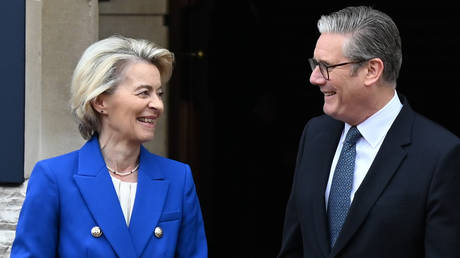 EU and UK impose more sanctions on Russia despite US concerns
EU and UK impose more sanctions on Russia despite US concerns
Speaking to RT later on Tuesday, Roeper said the EU had introduced personal sanctions against him because he has large audiences in Germany.
Brussels’ latest decision to sanction EU nationals should be of great concern to all German citizens, the blogger believes. He noted that the punitive measure against him was adopted despite there being “no court [decision], nobody said which law I have violated.”
“Without any court decision, some bureaucracy decided to freeze my money, to forbid working,” he told RT.
According to the author, the move “is a signal for all people in the European Union, because if they do it to us, and this goes through, tomorrow they will start doing the same… against any critics.”
He described the EU’s allegations against him as ludicrous. “I’m just a blogger sitting here in my kitchen and writing articles and I’m ‘destabilizing’ the EU which has a billion-euro budget for media work,” he quipped.
But what’s “not funny,” he noted, is that while he lives in Russia, people in Germany would have a hard time meeting their basic needs if their rights were curbed in a similar manner.
The EU’s latest round of sanctions primarily targeted Russia’s so-called ‘shadow fleet’ of oil tankers, which operate outside Western insurance systems. According to Brussels, Moscow has allegedly been using it to circumvent G7-led efforts to enforce a price cap on its crude oil exports.
-
Site: Zero HedgeNH's First Black Sheriff Jailed For Blowing Public Money On Travel With WomenTyler Durden Tue, 05/20/2025 - 16:40
A New Hampshire man who was heralded as the first black sheriff in the state's history was sentenced on Monday to 3 1/2 years in prison for squandering $19,000 of taxpayers' money on expensive getaways with multiple love interests -- and then lying to investigators about what he'd done. Tightly following the script we've seen so many times before, the disgraced "barrier-breaker" had previously said fellow Democrats who investigated his crimes were racists, and that his term in office was "rife with inequities." Despite repeatedly lying to the court and violating his bail conditions, his sentence was a fraction of what prosecutors sought.
At 35 years old, Democrat Mark Brave was also the youngest-ever sheriff in New Hampshire history when he was elected in November 2020 -- following the summer of George Floyd and amid the Black Lives Matter mania that swept the country and helped usher under-qualified blacks into many top roles in and out of law enforcement. "It’s something I feel should have happened a long time ago, but I’m honored that I will be the person to pave the way,” said Brave at the time. (Alas, some barriers proved insurmountable that year, as a self-described transgender Satanist lost the Cheshire County New Hampshire sheriff race.)
— Daniel Concannon (@TooWhiteToTweet) May 19, 2025“His repeated lies, misuse of taxpayer funds, and abuse of office were not just criminal — they were a profound betrayal of the public trust and the oath he took to serve with integrity,” said New Hampshire Attorney General John Formella in a statement. That said, the sentence handed down by lily-white Judge Dan St. Hilaire was far lighter than the seven- to 14-year confinement that prosecutors had requested. Brave will technically be eligible for parole in 3 1/2 years, but the reality is that he'll walk even sooner if he participates in certain prison programs. He must pay $18,969 in restitution to Strafford County.
 Mark Brave was led out of the courtroom in handcuffs (WMUR)
Mark Brave was led out of the courtroom in handcuffs (WMUR)
The judge's leniency was at odds with his characterization of Brave's conduct. “The court has reviewed a record that has been unlike any other case that has come before it, mainly because of the continuation of the crimes that were being committed while the case was proceeding." The judge was apparently referring to Brave's:
- Lying to the grand jury
- Lying on his application for public defense by failing to disclose $1.5 million received on the sale of his home
- Violating his bail conditions by paying $52,000 to lease an apartment in Boston, when he was mandated to remain in New Hampshire; he also traveled to Florida and Puerto Rico
- Lying to the judge, saying he was living in Dover with his ex-wife and that he was out of money
- Failing to disclose his purchase of a 1968 Porsche, though he posted videos and photos of the vehicle to social media
Brave went wild with his county credit card, using it to fund multiple trips to destinations in Florida, Baltimore and Maryland for getaways with various women -- with at least some of the trysts happening while Brave was married. He attempted to conceal his misuse of funds by attributing the travel to fictional business meetings and training sessions. He also lied to investigators and a grand jury. Some of his lies were exposed by hotel lobby security cameras that captured him in the company of women on trips where he claimed to have been traveling alone.
 Brave created an entirely-new job in his department for longtime "friend" Freezenia Veras -- then jetted off to Florida with her using a county credit card (NH Journal)
Brave created an entirely-new job in his department for longtime "friend" Freezenia Veras -- then jetted off to Florida with her using a county credit card (NH Journal)
Brave's misconduct started to unravel when an audit prompted an inquiry into JetBlue tickets purchased for a 2022 trip to Fort Lauderdale. Not content to merely steal public money, Brave opted for JetBlue's pricey "EvenMore" package, with the pair of tickets costing $1,615. Defending the expenditure, Brave said he needed the extra room because he's 6' 2" tall, and claimed he'd traveled with a "well-built, muscular" deputy. Investigators found, however, that he was traveling with female employee.
In another comical instance in which he was caught in a lie about a supposed business trip with a colleague, County Administrator Raymond Bower asked Brave why the hotel room only had a single king-bed. "There was a slight pause, and he said, “Oh, aw, the other person slept on the couch,” Bower said in an affidavit. He also lied about spending money on business meals associated with meetings with the completely fictional "New England Sheriff's Association."
He also installed a friend, Freezenia Veras, in a newly-created $80,000 job, and jetted off to Florida with her for a non-existent consultation with a law enforcement agency. In one of his many lies to a grand jury, Brave denied that he took another woman on a dinner cruise using his county credit card. When prosecutors whipped out a photo of Brave and the woman, he hilariously couldn't come up with her name: "Her name, her name is … um … let me see, I forget which one this is. I’ve been dating a lot of people,” he told the grand jury, according to NH Journal.
 Brave used public money for his trip to visit Kenisha Epps-Schmidt -- then talked her into giving him $2,300 for a used-car purchase he never made (NH Journal)
Brave used public money for his trip to visit Kenisha Epps-Schmidt -- then talked her into giving him $2,300 for a used-car purchase he never made (NH Journal)
Brave also traveled to Maryland to spend time with Kenisha Epps-Schmidt, whom he'd met online. He tried papering over that embezzlement by attributing the trip to a Washington DC meeting with Rep. Chris Pappas that never happened. Brave proceeded to cheat Epps-Schmidt out of $2,300 she gave him to buy a car -- which he never did.
Add it all up, and we have another low-IQ miscreant advanced to a position of authority because he had the right skin color. That's bad enough, but the black-catering madness carried over over to his sentencing, as a white Republican judge ensured a short stay in prison despite the black defendant's profound and repeated contempt for the criminal justice system all throughout the adjudication of his crime.
As part of his plea deal, Brave is barred from seeking a law enforcement job during his post-confinement probation. That still leaves him in prime position to become the boyfriend of a leftist congresswoman or a progressive NGO executive and take a salary for providing "security consultant" services. Just axe former Rep. Cori Bush or Black Lives Matters Global Network Foundation co-founder Patrissee Cullors how it works.
* * *
Best sellers at ZH Store last week:
- Steak Lover's Bundle (10 grass-fed, GMO-free, hormone-free steaks directly from the farm)
- Grassfed Ground Beef Bundle (10 lbs. of clean, grass-fed beef raised in southern Iowa)
- Ultra Combo Wagyu Bundle (you can't beat our meat! Straight out of Griswold, Iowa)
- Paper Street Tallow Set (Apparently chicks really dig this stuff...)
- ZeroHedge Waxed Canvas Hat (We keep selling out!)
 Click hat... add to cart... check out... receive awesome hat...
Click hat... add to cart... check out... receive awesome hat... -
Site: southern orders
This is the full video of Pope Leo’s visiting and Prayer Liturgy at The Basilica of Saint Paul Outside the Walls.
Is is so Papal and not really experienced in the past 12 years!
HOMILY OF HIS HOLINESS POPE LEO XIV Basilica of Saint Paul outside the Walls Tuesday, 20 May 2025The passage of Scripture that we have just heard is the opening of a beautiful letter written by Saint Paul to the Christians of Rome. Its message revolves around three great themes: grace, faith and justification. As we entrust the beginning of this new Pontificate to the intercession of the Apostle of the Gentiles, let us reflect together on that message. Saint Paul starts by saying that he received from God the grace of his vocation (cf. Rom 1:5). He acknowledges, in other words, that his encounter with Christ and his own ministry were the fruit of God’s prior love, which called him to a new life while he was still far from the Gospel and persecuting the Church. Saint Augustine, who was also a convert, spoke of the same experience in these words: “How can we choose, unless we have first been chosen? We cannot love, unless someone has loved us first” (Serm. 34, 2). At the root of every vocation, God is present, in his mercy and his goodness, as generous as that of a mother (cf. Is 66:11-13) who nourishes her child with her own body for as long as the child is unable to feed itself (cf. SAINT AUGUSTINE, Enn. in Ps. 130, 9). In the same passage, Paul also speaks of “the obedience of faith” (Rom 1:5), and here too he shares his own experience. When the Lord appeared to him on the road to Damascus (cf. Acts 9:1-30), he did not take away his freedom, but gave him the opportunity to make a decision, to choose an obedience that would prove costly and entail interior and exterior struggles, which Paul proved willing to face. Salvation does not come about by magic, but by a mysterious interplay of grace and faith, of God’s prevenient love and of our trusting and free acceptance (cf. 2 Tim 1:12). As we thank the Lord for the calling that changed Saul’s life, let us ask him to enable us to respond in the same way to his grace, and to become, ourselves, witnesses of the love “poured into our hearts through the Holy Spirit who has been given to us” (Rom 5:5). Let us ask the Lord for the grace to cultivate and spread his charity, and to become true neighbours to one another (cf. FRANCIS, Homily at Second Vespers of the Solemnity of the Conversion of Saint Paul, 25 January 2024). Let us compete in showing the love that, following his encounter with Christ, drove the former persecutor to become “all things to all people” (cf. 1 Cor 9:19-23), even to the point of martyrdom. In this way, for us as for Paul, the weakness of the flesh will show the power of faith in God that brings justification (cf. Rom 5:1-5). For centuries, this Basilica has been entrusted to the care of a Benedictine community. How can we fail to mention, then, as we speak of love as the source and driving force of the preaching of the Gospel, the insistent appeals of Saint Benedict, in his Rule, to fraternal charity in the monastery and hospitality towards all (Rule, cc. LIII; LXIII). I would like to conclude, though, by recalling the words that, more than a thousand years later, another Benedict, Pope Benedict XVI, addressed to young people: “Dear friends,” he said, “God loves us. This is the great truth of our life; it is what makes everything else meaningful.” Indeed, “our life originates as part of a loving plan of God,” and faith leads us to “open our hearts to this mystery of love and to live as men and women conscious of being loved by God” (Homily at the Prayer Vigil with Young People, Madrid, 20 August 2011). Here we see, in all its simplicity and uniqueness, the basis of every mission, including my own mission as the Successor of Peter and the heir to Paul’s apostolic zeal. May the Lord grant me the grace to respond faithfully to his call. -
Site: LifeNews
LifeNews Note: Congressman Chris Smith gave the following remarks during his address at Catholic University of America, which bestowed on him an honorary degree.
Thank you, Dr. Kilpatrick, for this honorary degree.
Thank you for offering students a world-class education here at the Catholic University of America that is faithful to, and centered on, the teachings of Jesus.
Great to be in Father O’Connell’s Hall—named for the former President of CUA—the extraordinarily effective, wise and holy Bishop David O’Connell of my Trenton, NJ diocese whom you honored right here in mid-March.
Click here to sign up for pro-life news alerts from LifeNews.com
Special thanks to my multi-decades long friend Bill Saunders for his amazing leadership at the Center for Human Rights as well as the Masters in Human Rights—initiatives that enlighten and empower women and men to strive to protect the weakest and most vulnerable.
The world needs their voices and commitment now more than ever.
Thank you for your commitment to heroic human rights defenders like Chen Guangcheng—who, along with his wife, endured and overcame torture and gross mistreatment by Xi Jinping for exposing and combatting the Chinese Communist Party’s draconian one-child policy with its reliance on forced abortion and coercive sterilization to achieve its nefarious goals.
And of course, we absolutely celebrate our new American Pope, Leo XIV. The renewed hope and well-founded expectations are remarkable. Apart from the Holy Spirit, who saw that coming?
Protection of human rights is the core motivator for my service in Congress and it begins with the right to life. Stopping the violence of abortion is what led me to run for the House, with the complete support of my dear wife Marie.
As a college student, I met Marie at a campus Mass at then Trenton State College, now College of New Jersey, more than fifty years ago. She joined me and Marty Dannenfelser— best known now as the husband of the president of Susan B Anthony Pro-life America Majorie Dannenfelser— in the pro-life group we established on campus as part of the National Pro-Life Youth Coalition—the forerunner of Students for Life.
Marie chaired the group until her graduation in 1977, the same year that now Pope Leo XIV graduated from neighboring Villanova where he had established a student pro-life group.
She has been a powerful, talented and incredibly wise, faith-filled pro-life leader, especially in the battle to defend human life around the world serving on Holy See delegations at the United Nations and through an organization she founded two decades ago called the Parliamentary Network for Critical Issues (PNCI).
Words are inadequate to express my love, respect, admiration and gratitude for Marie. She couldn’t join us this evening because she is recovering from a serious illness.
Like you, we know that the cruel injustice of abortion need not be forever and that each day, despite setbacks, many unborn children and their mothers have been and are being protected. We have hope.
We are a people of indomitable hope—we absolutely refuse to entertain discouragement or defeat.
One such man of hope is Bishop Su—a leader of the Underground Catholic Church—who I met in Beijing in 1994.
Despite decades of incarceration and torture, Bishop Su told me that he earnestly prayed for his persecutors and harbored no malice for his tormentors—an awe-inspiring example of faithfulness to Jesus’ teaching in the Gospel from Luke: “To you who hear I say, love your enemies, do good to those who hate you, bless those who curse you, pray for those who mistreat you.”
Women and men of faith around the world are facing unspeakable violence as religious persecution explodes throughout the world—from Nicaragua, to Nigeria to the Middle East to China to North Korea and elsewhere..
The scrouge of modern-day slavery, sex and labor trafficking, is denying millions of people their human rights. Twenty five years ago, the U.S. Congress approved and the President signed historic legislation that I authored—the Trafficking Victims Protection Act of 2000—a comprehensive whole-of-government initiative to combat sex and labor trafficking in the United States and around the world.
The TVPA created a new, well-funded whole-of-government domestic and international strategy and established numerous new programs to protect victims, prosecute traffickers and to the extent possible, prevent human trafficking in the first place—the three Ps. (This week in New York, the trial of P. Diddy Combs is underway. Like Jeffrey Epstein, Diddy has been charged for allegedly committing heinous sex trafficking crimes and the U.S. Attorney is using the the Trafficking Victims Protection Act of 2000—to prosecute. To date more than 2,225 convictions with very long jail sentences have been rendered using the Trafficking Victims Protection Act of 2000.)
Forced organ removal is another horrific human rights violation.
Last week, the House of Representatives passed legislation I sponsored entitled the Stop Forced Organ Harvesting Act of 2025 that targets the worldwide barbaric practice of murdering victims to steal their vital organs. Special thanks to the Chief of
Staff of the Congressional-Executive China Commission Piero Tozzi for his research and work in passing the bill.
The Chinese Communist Party is committing this trafficking abuse like no other—and Xi Jinping is making billions.
Each year, tens of thousands of young victims, perhaps more—average age 28— are slaughtered by the Chinese Communist Party for their organs. Ethnic groups targeted for mass harvesting include Muslim Uyghurs—who suffer from Xi Jinping’s ongoing genocide—and the Falun Gong, whose peaceful meditation and exercise practices—and exceptional good health—make their organs highly desirable. The Chinese Communist Party has declared them to be an ‘evil cult’—fit for butchering.
Under my bill, anyone complicit with these crimes would face both civil and criminal penalties including up to 20 years in prison.
Human rights violations need warriors to stop the practices and protect the victims. I pray that Catholic U, especially the Center for Human Rights, will create such warriors.
Jesus implored us in Matthew 25:45, “Truly I tell you, whatever you did not do for one of the least of these, you did not do for me.”
We must never quit nor grow weary in the defense of human rights. Injustice need not be forever. Many are depending on us.

The post Congressman Chris Smith: We Must “Stop the Violence of Abortion” appeared first on LifeNews.com.
-
Site: LifeNews
The Brigid Alliance, an organization dedicated to getting abortions for more women, launched an ad campaign Monday targeting pro-life pregnancy centers and university campuses.
Brigid provides funding for women traveling to receive abortions, covering costs such as transportation, meals, hotels and child care. The organization set up several billboards in Georgia and Louisiana and also targeted online campaigns toward Floridians. Brigid has mobilized several billboard trucks advertising their abortion services.
“Need an abortion?” the billboards read, listing the services Brigid provides.
Three static billboards are set up in New Orleans, and two are in Atlanta, with several billboard trucks circling the local universities and crisis pregnancy centers that support life. Targeted digital and audio ads on Facebook, Instagram, Google Search and Pandora will specifically reach Florida residents.
Click Like if you are pro-life to like the LifeNews Facebook page!
(function(d, s, id) { var js, fjs = d.getElementsByTagName(s)[0]; if (d.getElementById(id)) return; js = d.createElement(s); js.id = id; js.src = "//connect.facebook.net/en_US/sdk.js#xfbml=1&version=v2.10"; fjs.parentNode.insertBefore(js, fjs); }(document, 'script', 'facebook-jssdk'));
Emory, Georgia State, DeVry, Tulane, Louisiana State, the University of New Orleans, Loyola and more universities are all targeted.
Brigid targeted the three states due to their sweeping pro-life laws, a media advisory from the company said.
Republican Florida Gov. Ron DeSantis signed the state’s six-week abortion ban into law in 2023, though pro-abortion advocates unsuccessfully attempted to undermine the law in the 2024 election.
A similar heartbeat law has been in place in Georgia since 2019 but was not applicable until after the fall of Roe v. Wade. The law has prevailed through several legal challenges with the state supreme court finally settling its legality in 2022.
The Louisiana Supreme Court also upheld its own state law banning all abortions except in cases threatening or endangering the mother’s life or when a child cannot survive birth.
Brigid did not immediately respond to the Daily Caller News Foundation’s request for comment.

The post Radical Group Runs Pro-Abortion Ads Across Pro-Life States to Kill More Babies appeared first on LifeNews.com.
-
Site: Zero HedgeBoomers, Let's Face It: The Math Doesn't WorkTyler Durden Tue, 05/20/2025 - 16:20
Authored by Charles Hugh Smith via OfTwoMinds blog,
There are many consequential things we can't discuss factually because the topic upsets everyone. And since getting upset shuts down any direct discussion of difficult issues, these issues metastasize into problems that end up sinking the ship.
The Titanic has already struck the iceberg and is doomed, but since this upsets the passengers, we dance around the facts rather than take immediate action. Everything about the situation is upsetting, and so emotions dominate the zeitgeist: resentments, blame-game, accusations, the whole self-reinforcing dynamic leads to people shouting at others as they drown. The last word, indeed.
Federal deficit spending and the overweighting of entitlement spending on retirees is too upsetting to discuss factually, so we don't. But the math doesn't work, and so the ship will sink. This was obvious 20 years ago, when I posted this: Boomers, Prepare to Fall on Your Swords (June 2005), in which I suggested that well-off Boomers address the problem by gracefully making the necessary sacrifices rather than heap them on the younger generations.
It was even more obvious by 2013, when I posted this: Generation X: An Inconvenient Era (May 23, 2013), in which correspondent Eric A. explains how the math doesn't work.
Let's start with some necessary stipulations. When I suggest well-off Boomers accept the need to make sacrifices to save the ship from sinking, I suggest this as someone in this cohort.
I am a Boomer, drawing my Social Security benefit, which like my lifetime income, is close to the national median SSA benefit. I'm solidly in the middle of the pack. Being over the age of 65, I also have Medicare benefits. Like many others of my generation, I've lived frugally, saved money, worked hard, etc. Since I'm still working, I pay Social Security and Medicare taxes--15.3% of all earned income as I am self-employed.
Unlike others in my generation, I attribute only a modest percentage of my net worth to frugality and working hard, as the majority of whatever "wealth" I own is the direct result of the hyper-financialization credit-asset bubble that's been inflated since 2007.
Those who were able to buy assets such as houses and stocks decades ago saw their net worth rise to extraordinary heights in the bubble. Those who didn't or couldn't buy assets before the bubble did not see their net worth rise to extraordinary heights.
Let's go over how we got here. The current federal tax system and retiree benefits evolved in the 1930s to the mid-1960s. In the 1930s, retirement meant poverty for many workers who were unable to save a nestegg large enough to fund their no-earnings years. Social Security was enacted as a way of using the SSA taxes paid by current workers (1% of wages in those days) to fund a modest retirement income for retirees.
Social Security was always a pay as you go system. Whatever SSA tax revenues that weren't distributed piled up in a Trust Fund. This Trust Fund was eliminated in the mid-1960s, and excess SSA taxes went into the federal general fund. The current Trust Fund is a useful fiction. When SSA runs a deficit, the Treasury funds the deficit by selling Treasury bonds, just as it does with all other deficit spending.
Political realities demanded that the program be universal to attract widespread support. So millionaires collect Social Security and Medicare benefits, too. As SSA's financial foundations erode, a modest reform was enacted: above a modest income, 50% of SSA benefits are taxed as regular income.
Back when the program was enacted, there were around 10 workers for every retiree. The demographics and economy were different then. The economy was mostly domestic, and the bubble of the 1920s had popped. Financialization and globalization were at low ebb. Everyone assumed there would always be 10 workers for every retiree.
But people started living longer, the disabled were added to Social Security, and Medicare ballooned from a modest program to an open-ended spending juggernaut. In other words, the economy changed, demographics changed, but the system has not been changed to reflect these realities. SSA and Medicare taxes have increased dramatically, but these programs are still funded by payroll taxes paid by employees and employers.
Capital (assets, income from capital gains, speculation and investments) only pays a thin slice of Medicare via the Net Investment Income Tax (NIIT) on capital gains incomes above $200,000 for single taxpayers and above $250,000 for couples filing jointly.
What we're actually discussing isn't just generational; it's 1) the open-ended nature of the Medicare and Medicaid programs, 2) the impossibility of relying on two workers to pay all the benefits for each retiree as the number of retirees and beneficiaries exceeds 69 million people while the full-time workforce is 135 million, and 3) the extraordinary wealth divide in the U.S. where the majority of the wealth is held by the top few percent and the retiree generation (Boomers) for the reasons stated above.
The solutions are as obvious as plugging a hole in the ship's hull.
1) The tax burden has to be shifted from labor to capital via financial transaction taxes and ending the multi-trillion dollar exclusions on capital gains.
2) Social Security and Medicare benefits must be means tested; those collecting $10,000 a month in other pensions and investment income don't need Social Security benefits, which should be reserved for those with no other substantive source of steady income in their retirement years.
3) The open-ended entitlement programs must be limited in some fashion, and there is no way to do this that will not upset everyone. Hard choices--triage--must be made, as doing nothing is choosing to let the ship sink.
Let's feast on the facts of the matter. Those who need a calming agent, please do so now.
Here's household/non-profit net worth. The household sector has a net worth of $160 trillion. Notice that the total is far above the inflation rate. This is a credit-asset bubble on steroids.
Here is total debt. Borrow a bunch of money into existence and dump it into financial speculation, and voila, a debt-fueled asset bubble for the ages.
Here is total public debt. Is a parabolic rise really sustainable? No, the math doesn't work, especially as interest rates rise: the debt costs nothing to service at 0%, but the interest payments are huge at 4%.
Apologists love to attribute the debt to inflation or "growth," but that's misdirection. As a percentage of the nation's GDP (gross domestic product), the debt has risen 4-fold since president Reagan shepherded Social Security reforms in the early 1980s, and doubled as a percentage of GDP since 2007, before the Federal Reserve bailed out the status quo with hyper-financialization.
Here is a pie chart of federal spending. Social Security, Medicare and Medicaid are 44%. Toss in the other mandatory spending--a big chunk of which is interest paid on federal debt--and there's not much left to cut. The reality is there is no way to slow the runaway debt train without tackling open-ended retirement / healthcare programs.
The vast majority of projected growth in federal spending stems from these programs and the interest paid on funds borrowed to fund them. Unfortunately, these facts don't disappear because we don't like them.
Boomers hold the majority of net worth. So it follows that increasing taxes on capital will impact the Boomers who are wealthy--and younger folks who are wealthy, too, of course.
It's interesting how debt and the net worth of the top 1% have soared in tandem. Could it be that soaring debt-asset bubbles have benefited the top 1% far more than the debt bubble has benefited the bottom 50%? And if that's the case, then what does this suggest in terms of saving the ship from sinking?
The passengers on the Titanic arguing with each other can't stop the ship from sinking by "winning the argument." Silencing those willing to discuss the issues factually doesn't actually make the factual realities go away.
Those of us who run businesses / are self-employed don't have the luxury of not dealing with financial realities. Triage comes with every enterprise. We need a national discussion of triage that doesn't immediately degrade into denial or histrionics. And no, AI and stablecoins aren't going to make all this go away, any more than hoping the Central Bank of Mars will emerge to give us a 36 trillion-quatloo bailout.
Boomers--and Gen X, Millennials, Gen Z--let's face it: the math doesn't work. Triage means sacrifices will have to be made and distributed to those most able to afford them to spare those least able to afford them. The ship is not just taking on water; it's loaded with third rails and sacred cows that can't be touched, and so it's doomed to sink if we do nothing.
-
Site: OnePeterFive

As all the world knows, Chicago native Robert Cardinal Prevost, O.S.A. was elected Pope on May 8, 2025, and took the name Leo XIV. For many of us, the cessation of the preceding Pontificate came, tragically, as a relief. The new Pontiff’s taking of a traditional Papal name and appearance in traditional Papal garments was a healing balm for such as these. The fact that he was an American was a…
-
Site: Novus Motus LiturgicusDuring the Jubilee year of 1450, Pope Nicholas V canonized the Franciscan St Bernardine (Bernardino) of Siena (1380-1444), who had died six years earlier, and whose feast is kept today. This was an unusually quick process for the era, especially considering how varied the Saint’s career had been; he had preached all over Italy, performed countless miracles, produced a large body of writings, and Gregory DiPippohttp://www.blogger.com/profile/13295638279418781125noreply@blogger.com0
-
Site: LifeNews
Delaware Governor Matt Meyer tragically signed the state’s assisted suicide bill into law. Delaware’s law passed in the legislature by one vote after ten years of public opposition.
The legislature narrowly passed the dangerous bill legalizing assisted suicide for terminally ill adults, despite strong opposition from medical and disability rights groups.
Carol Tobias of National Right to Life condemned Meyer’s signing in a statement to Lifenews:
Delaware’s new law puts lives at risk. Assisted suicide laws offer no compassion, no hope, and no help for vulnerable members of our society.
End-of-life discussions should focus on palliative care, hospice, and support options. Assisted suicide shifts the focus from life-affirming care to premature death and erodes the public trust in healthcare and medical doctors.
So-called safeguards do not work. No safeguard can fully prevent subtle pressures, as evidenced by Dutch Alzheimer’s cases where patients were euthanized despite earlier expressions of doubt or resistance, including a widely reported case in which a woman was euthanized against her will while being physically restrained by her family and doctor.
Click Like if you are pro-life to like the LifeNews Facebook page!
(function(d, s, id) { var js, fjs = d.getElementsByTagName(s)[0]; if (d.getElementById(id)) return; js = d.createElement(s); js.id = id; js.src = "//connect.facebook.net/en_US/sdk.js#xfbml=1&version=v2.10"; fjs.parentNode.insertBefore(js, fjs); }(document, 'script', 'facebook-jssdk'));
The horror of assisted suicide is that many of the most vulnerable in our society are pressured to “choose” assisted suicide which normalizes a culture of death—devaluing the lives of the disabled, elderly, and chronically ill. As society attitudes shift, legalization creates a “duty to die” mindset and puts our most vulnerable members of society at risk.
The legislation, which allows mentally capable adults with a prognosis of six months or less to request and self-administer lethal medication, passed the House on March 18 with a 21-16 vote and cleared the Senate on June 24 by an 11-10 margin, mirroring its passage in 2024 before being vetoed by then-Gov. John Carney.
The bill faced fierce resistance from the Delaware Academy of Family Physicians, the Psychiatric Society of Delaware, and the Delaware Chapter of the American College of Physicians, alongside disability advocates and faith-based organizations.
Jessica Rodgers, coalitions director for the Patients’ Rights Action Fund, condemned the legislature’s decision, telling LifeNews, “The legislature chose to disregard the opposition of the Delaware Academy of Family Physicians, the Psychiatric Society of Delaware, and the Delaware Chapter of the American College of Physicians in their actions today, as well as countless other medical and disability rights organizations.”
Critics argue the bill undermines medical ethics and risks coercion, particularly for vulnerable populations.
Ellen Barrosse, in an opinion piece for The Dialog, wrote, “Physician-assisted suicide sends a message to those who are disabled, elderly, or ill that their lives are not worth living. … Any law that encourages people to end their lives prematurely ignores the reality that prognoses are often wrong.
The Diocese of Wilmington, led by Bishop William E. Koenig, has also opposed the bill, citing the sanctity of life.
Disability advocates, like Daniese McMullin Powell, former chair of the State Council for Persons with Disabilities, warned that normalizing assisted suicide could pressure patients into feeling they have no other choice, stating, “When such laws take the stigma off of having assistance or even doing it yourself that it’s okay, it makes it more common.”

The post Delaware Governor Matt Meyer Signs Bill Legalizing Assisted Suicide appeared first on LifeNews.com.
-
Site: Zero HedgeNo Trial Data, No Vax: FDA Demands Gold Standard Testing For Any New COVID-19 VaccinesTyler Durden Tue, 05/20/2025 - 15:40
Authored by Zachary Stieber via The Epoch Times (emphasis ours),
The Food and Drug Administration (FDA) will not approve COVID-19 vaccines for many Americans absent trial data showing that the benefits outweigh the risks, top agency officials said on May 20.
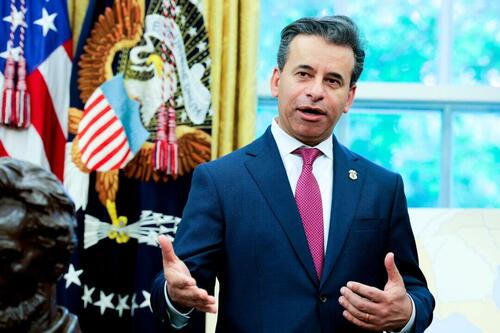 Dr. Marty Makary, commissioner of the Food and Drug Administration, in Washington on May 5, 2025. Anna Moneymaker/Getty Images
Dr. Marty Makary, commissioner of the Food and Drug Administration, in Washington on May 5, 2025. Anna Moneymaker/Getty Images
“Moving forward, the FDA will adopt the following Covid-19 vaccination regulatory framework: On the basis of immunogenicity—proof that a vaccine can generate antibody titers in people—the FDA anticipates that it will be able to make favorable benefit–risk findings for adults over the age of 65 years and for all persons above the age of 6 months with one or more risk factors that put them at high risk for severe Covid-19 outcomes,” such as asthma or cancer, FDA Commissioner Dr. Marty Makary and Dr. Vinay Prasad, head of the FDA’s Center for Biologics Evaluation and Research, wrote in a New England Journal of Medicine article.
“For all healthy persons—those with no risk factors for severe Covid-19—between the ages of 6 months and 64 years, the FDA anticipates the need for randomized, controlled trial data evaluating clinical outcomes before Biologics License Applications can be granted.”
Pfizer, Moderna, and Novavax, which have received licenses for their COVID-19 vaccines, did not immediately respond to requests for comment.
Several medical groups that have commented on FDA steps concerning COVID-19 vaccines, such as the American Academy of Family Physicians, did not return inquiries.
The FDA in 2024, in its most recent action concerning the Pfizer and Moderna vaccines, approved updated versions for most Americans and extended emergency authorization for others, despite there being no trial data available for those formulations.
The regulatory agency on May 16 approved Novavax’s COVID-19 vaccine for the first time. The approval was for adults aged 65 and up. The agency said that people aged 12 to 64 could receive a Novavax shot, but only if they have one of the conditions that puts them at higher risk for severe COVID-19 outcomes.
An earlier version of Novavax’s shot was tested in a randomized, controlled trial in 2021.
The Centers for Disease Control and Prevention currently recommends that people aged 6 months and older receive one of the latest COVID-19 vaccines, but just 13 percent of children and 23 percent of adults have followed that recommendation.
Makary and Prasad noted that a number of other countries, such as Australia and Germany, only recommend COVID-19 vaccines to certain populations.
“While all other high-income nations confine vaccine recommendations to older adults (typically those older than 65 years of age), or those at high risk for severe Covid-19, the United States has adopted a one-size-fits-all regulatory framework and has granted broad marketing authorization to all Americans over the age of 6 months,” they wrote on Tuesday. “The U.S. policy has sometimes been justified by arguing that the American people are not sophisticated enough to understand age- and risk-based recommendations. We reject this view.”
The officials said that while the quick development of COVID-19 vaccines was a scientific and medical achievement, the benefit of repeated dosing—some people have received at least six doses—is unclear.
The trials of the vaccines should measure prevention of symptomatic COVID-19, with secondary endpoints including severe COVID-19, hospitalization, and death, according to Makary and Prasad, who said that the trials should include participants who contracted COVID-19 within the past year, and they should follow participants for at least six months “to ensure that early booster gains persist.” The control group could receive a saline placebo, the officials said.
“Ultimately, these studies alone can provide reassurance that the American repeat-boosters in-perpetuity strategy is evidence-based,” they wrote.
Health Secretary Robert F. Kennedy Jr. recently pledged to require placebo-controlled trials for new vaccines.
Makary and Prasad planned to talk about the policy update at 1 p.m. on Tuesday.
This is a developing story that will be updated.







